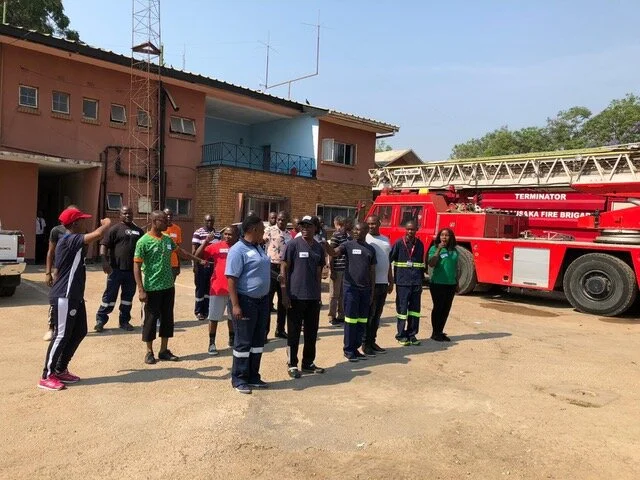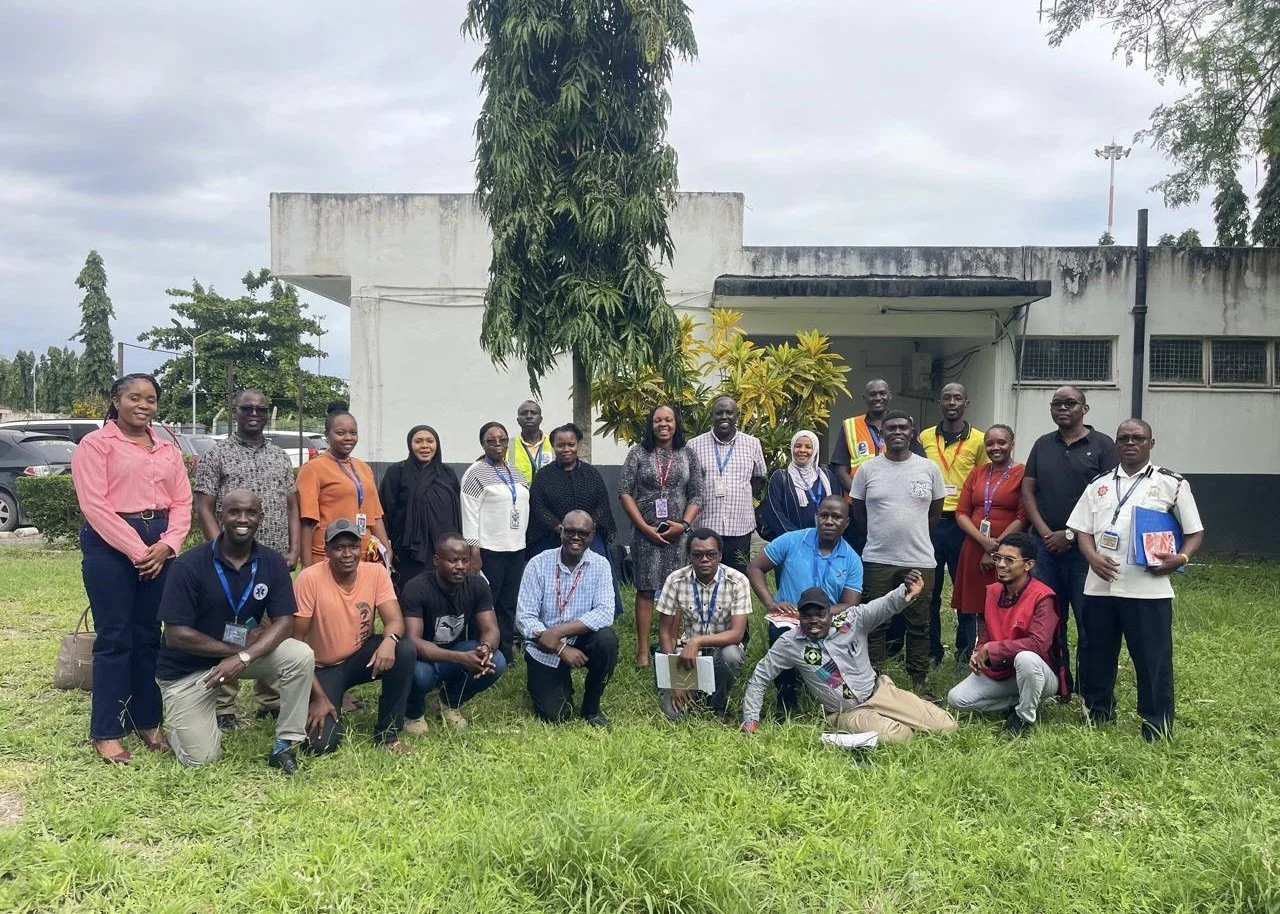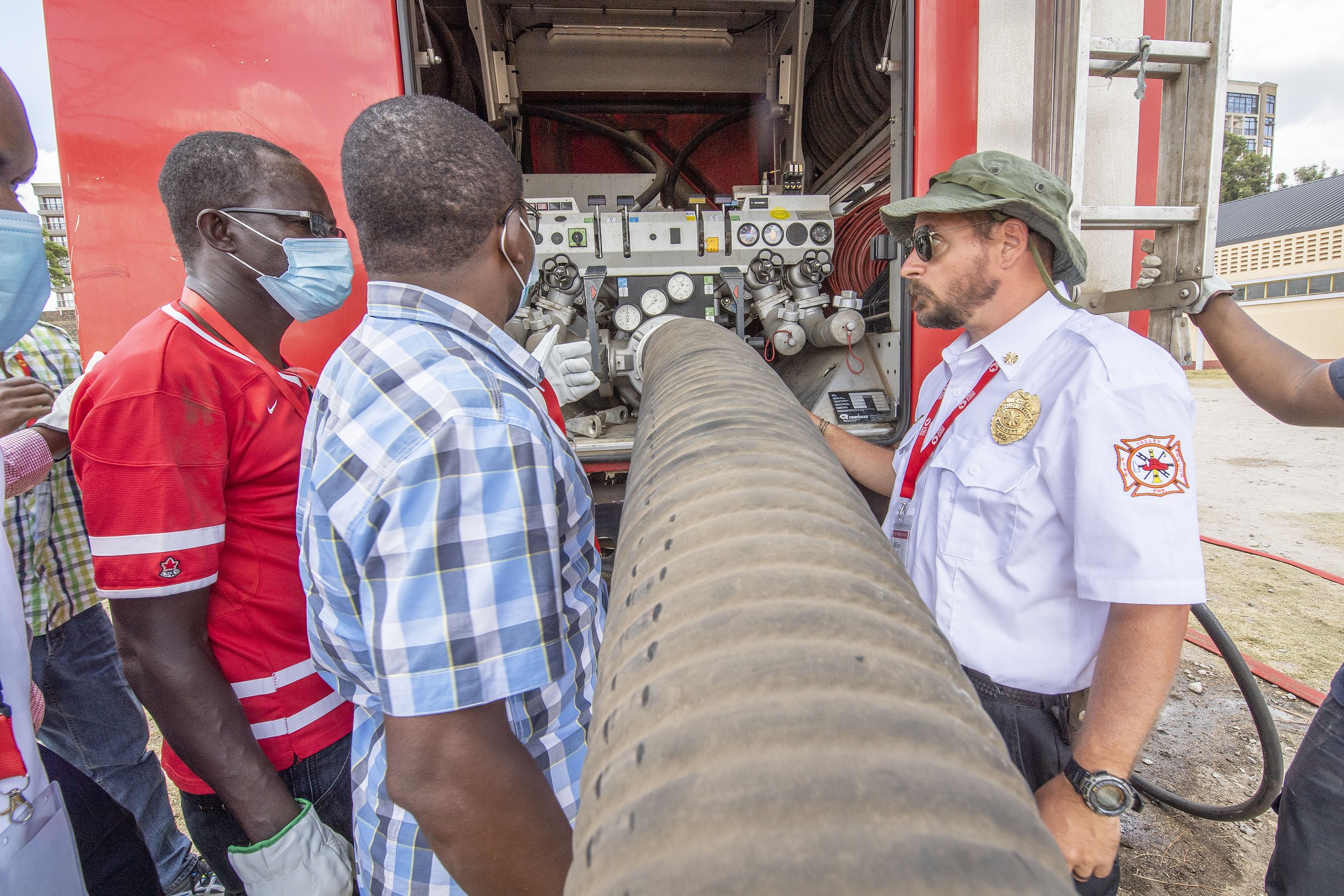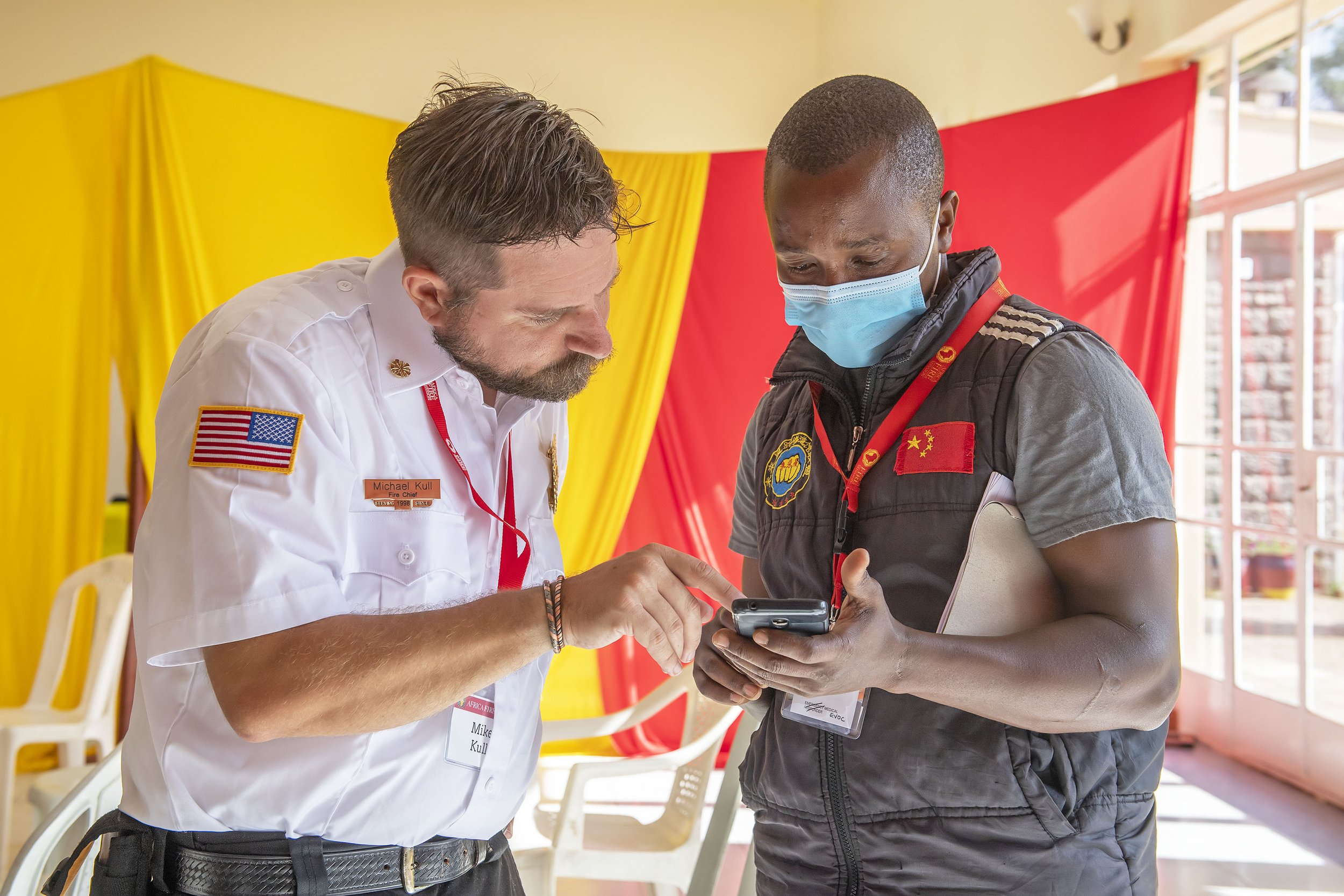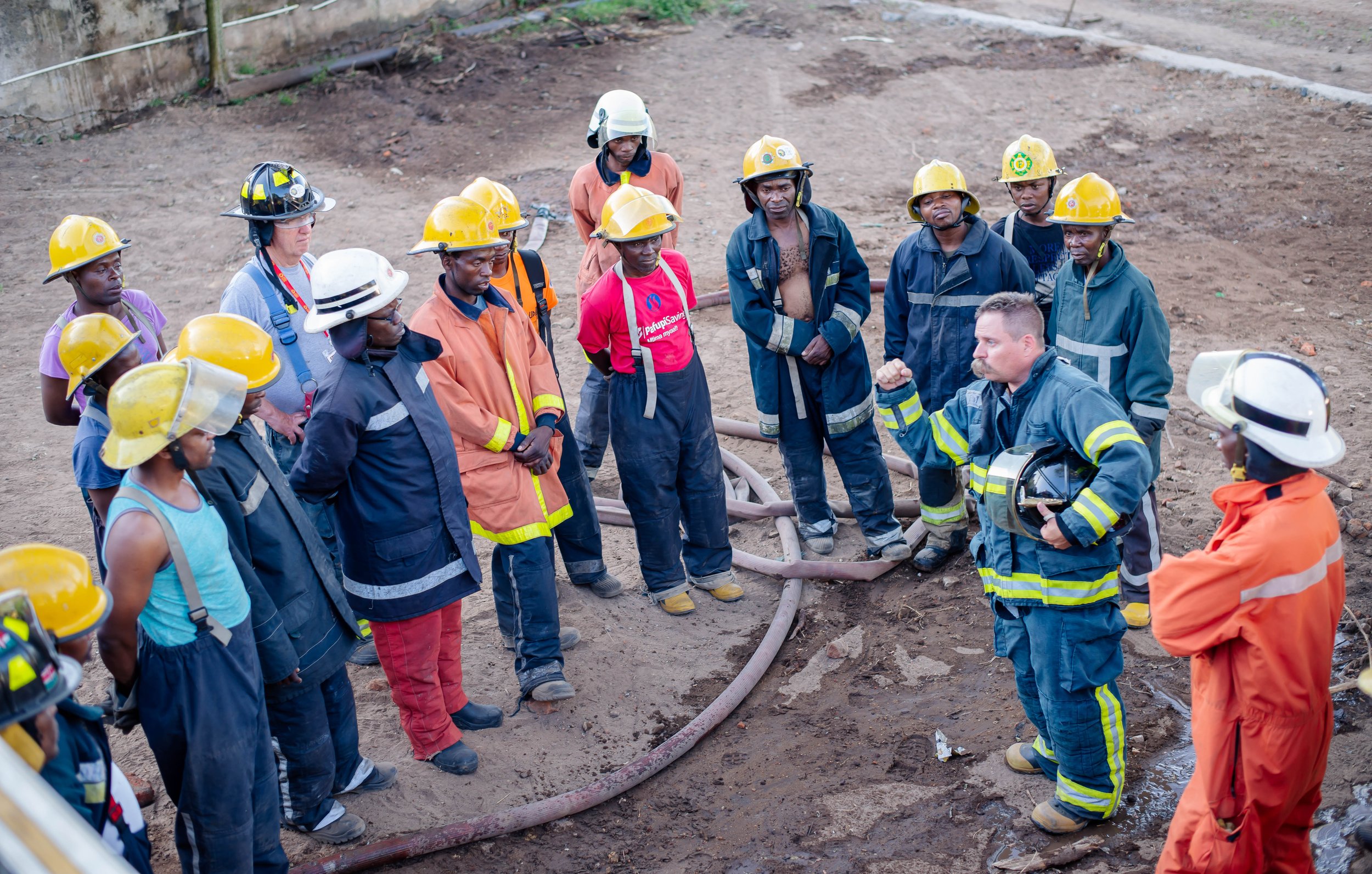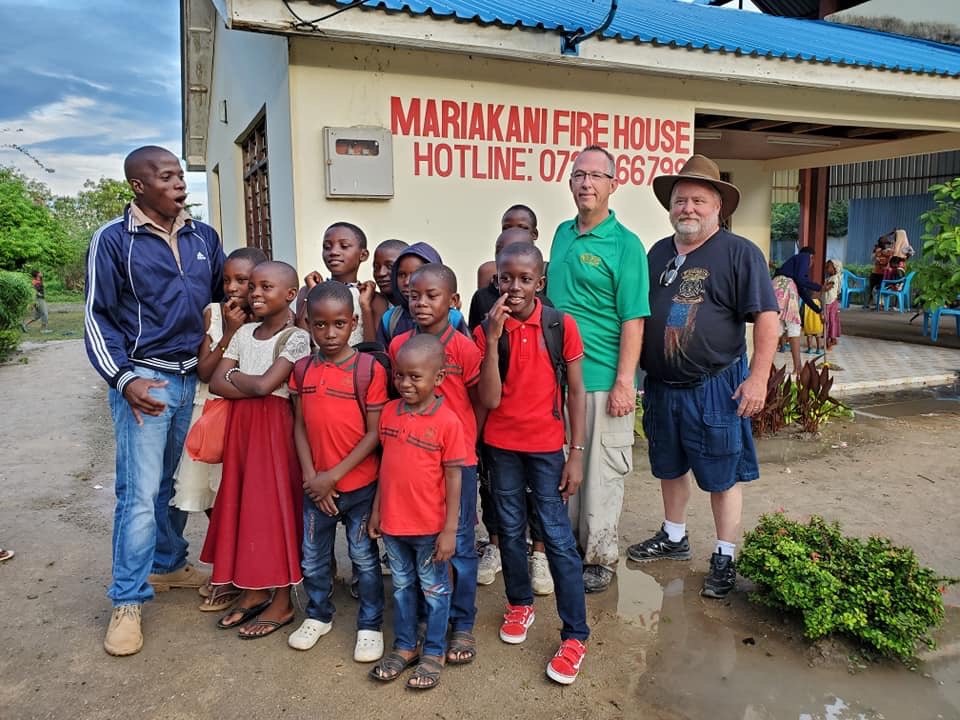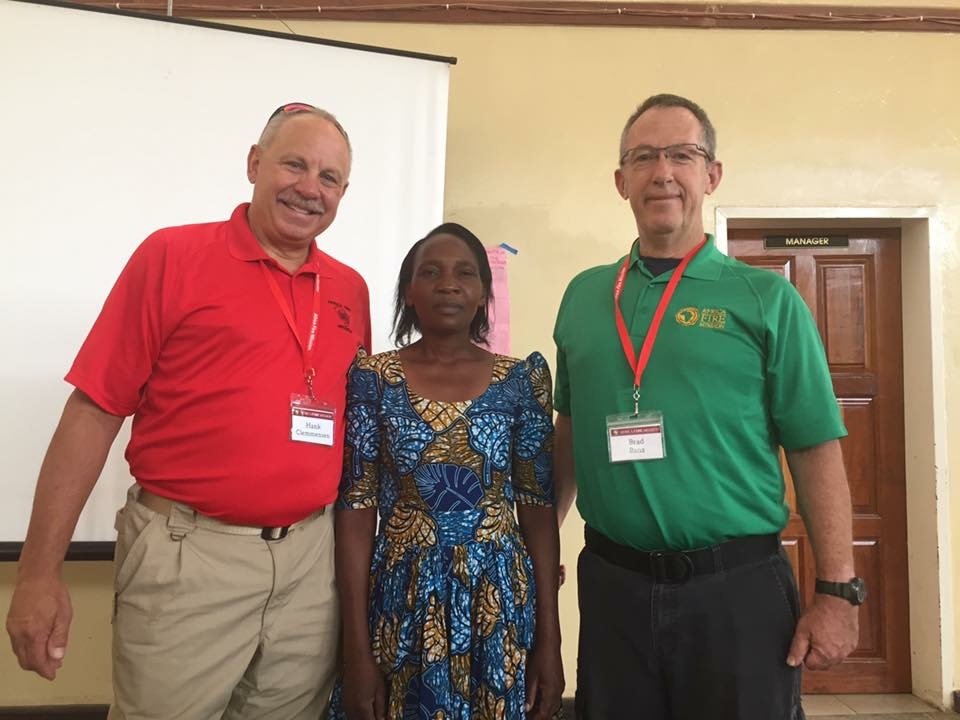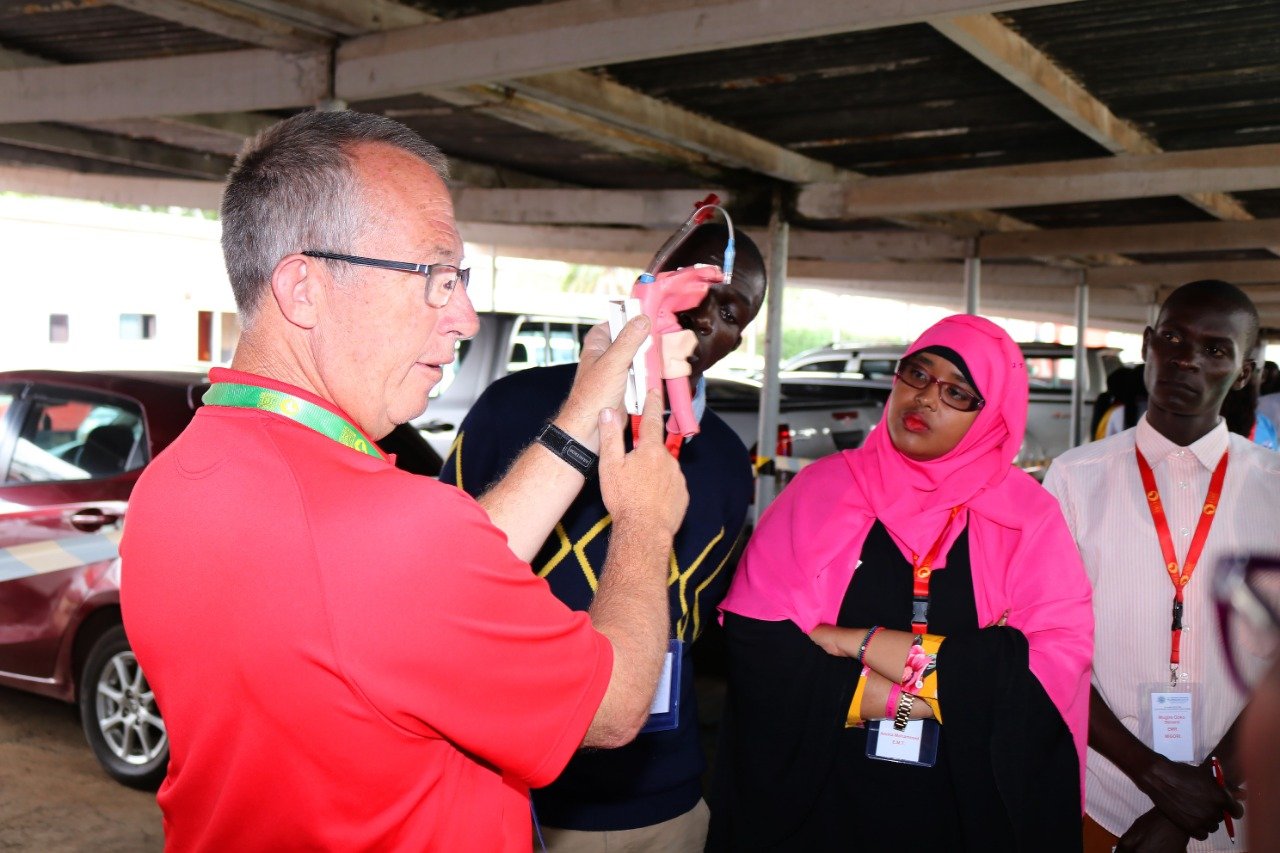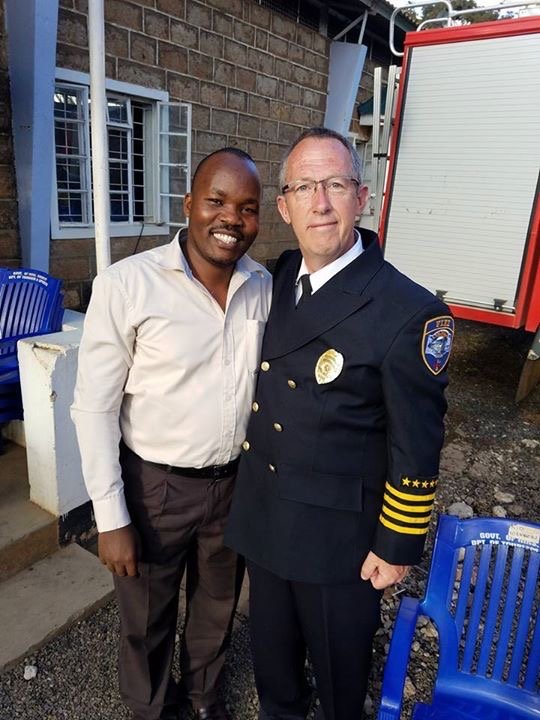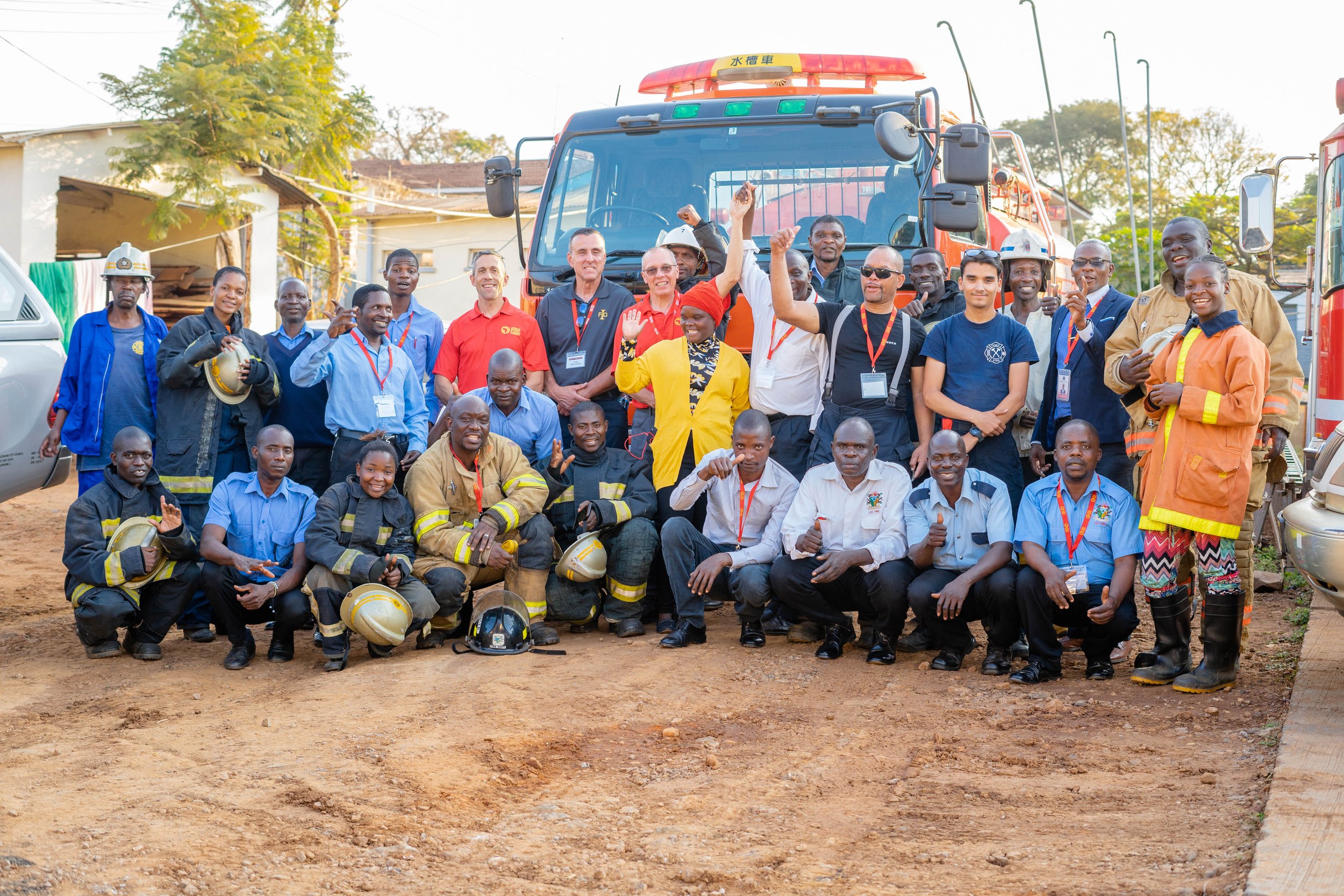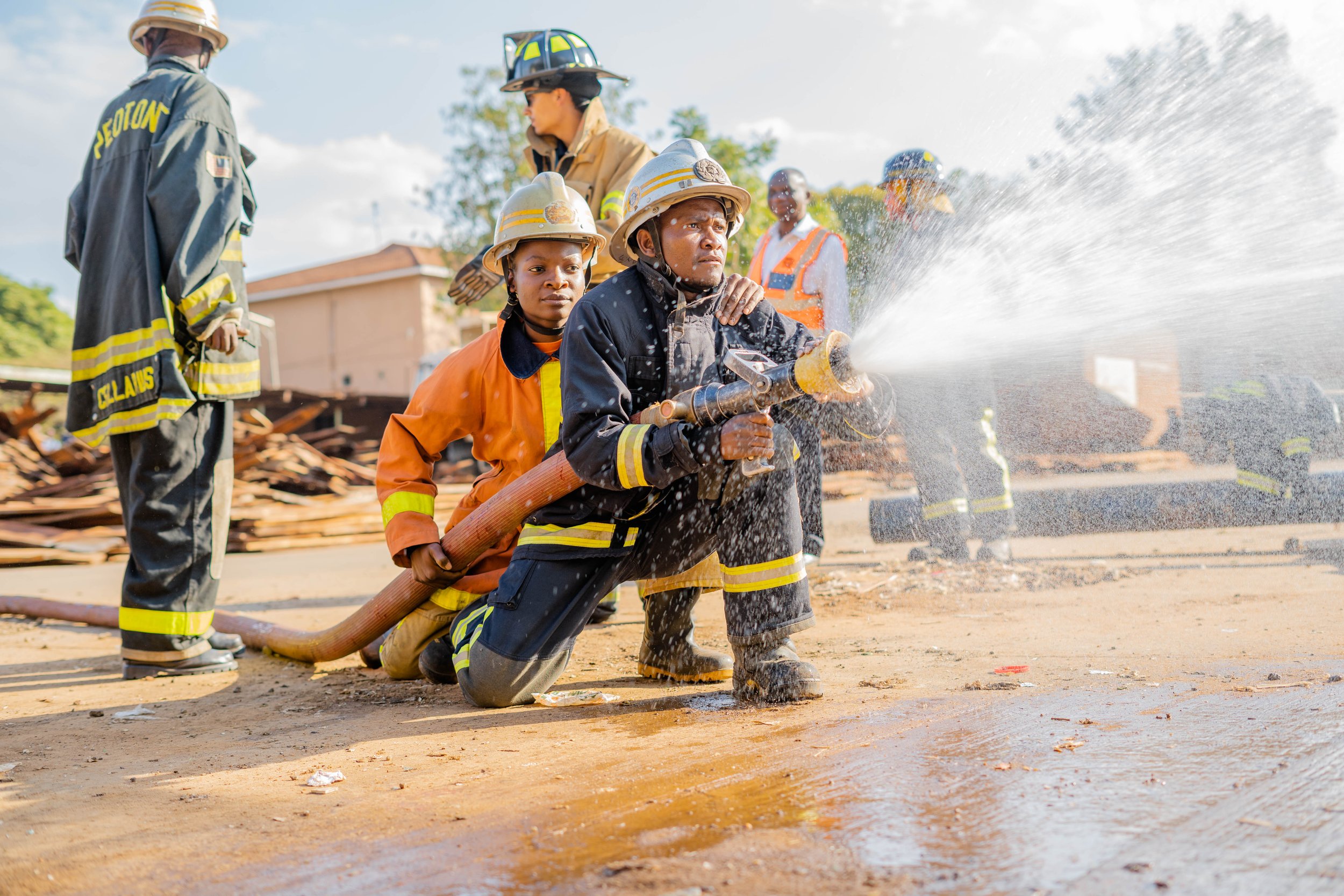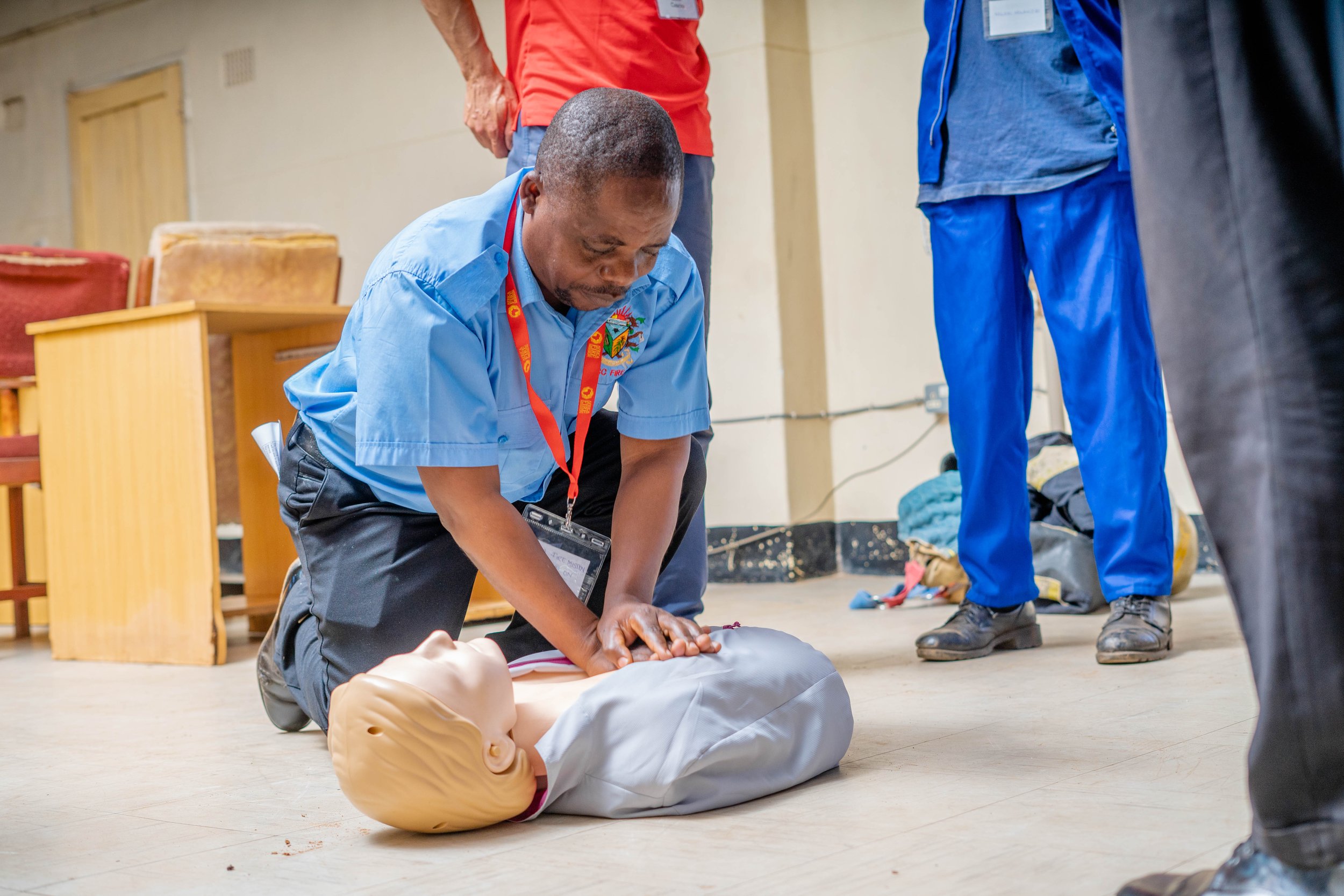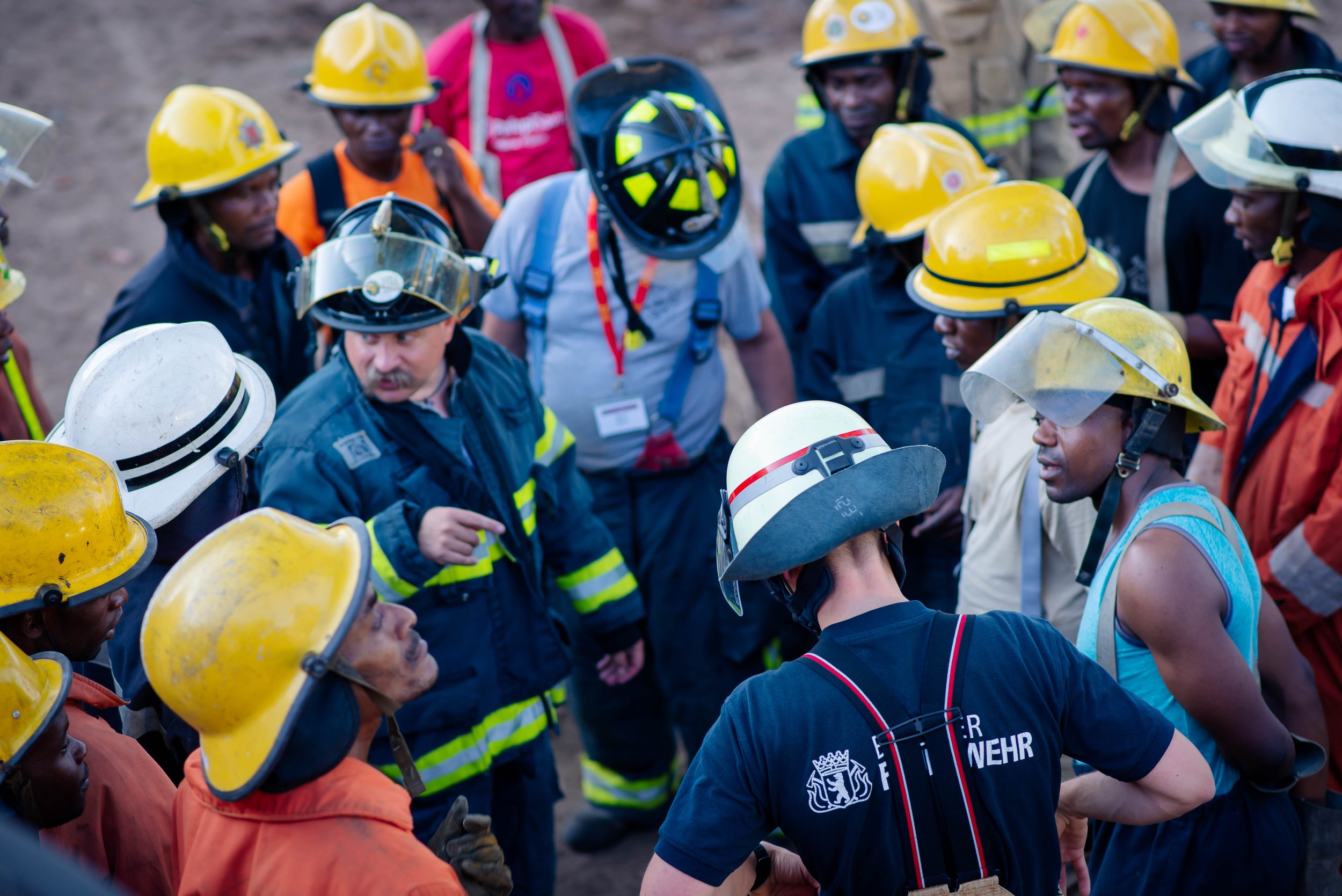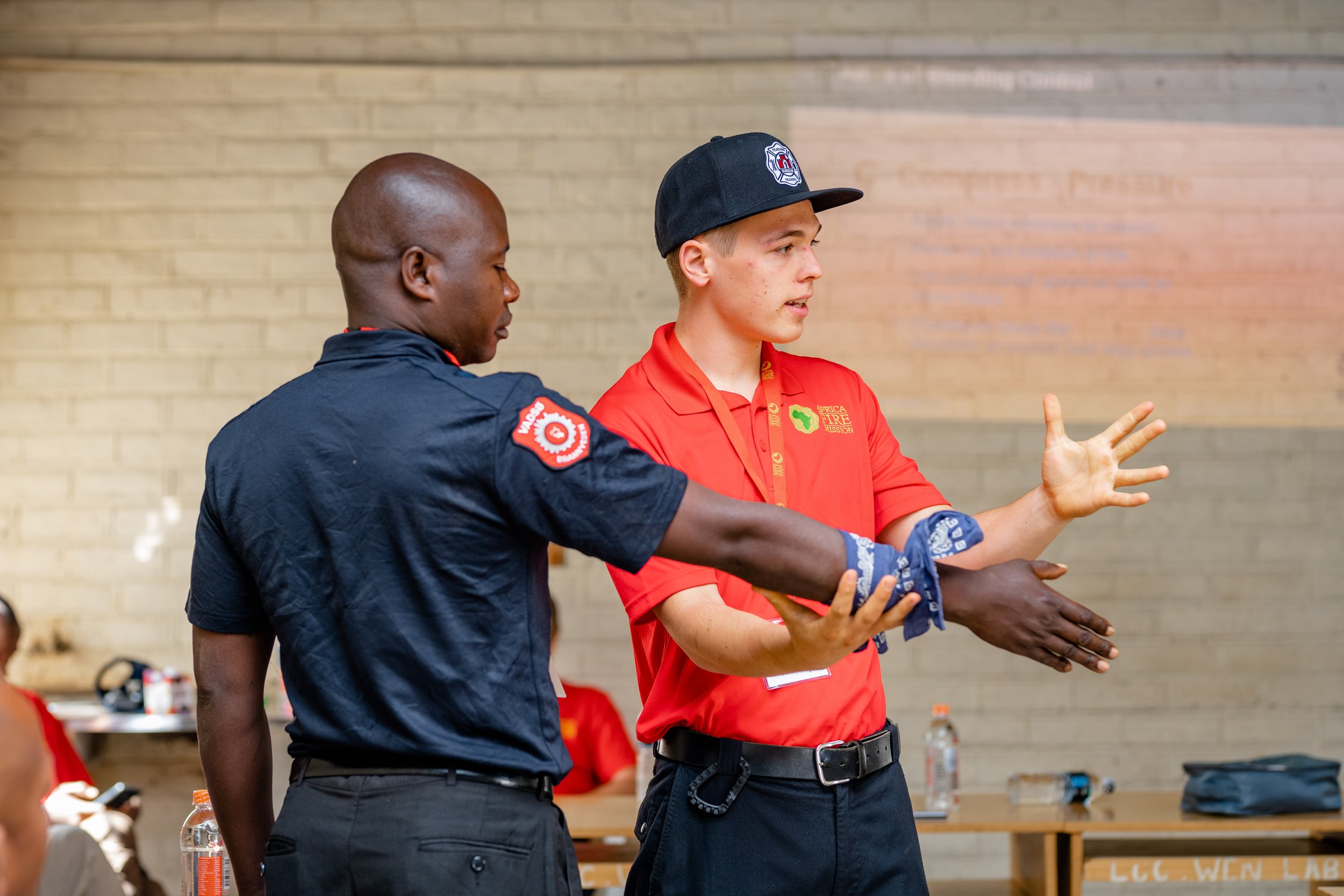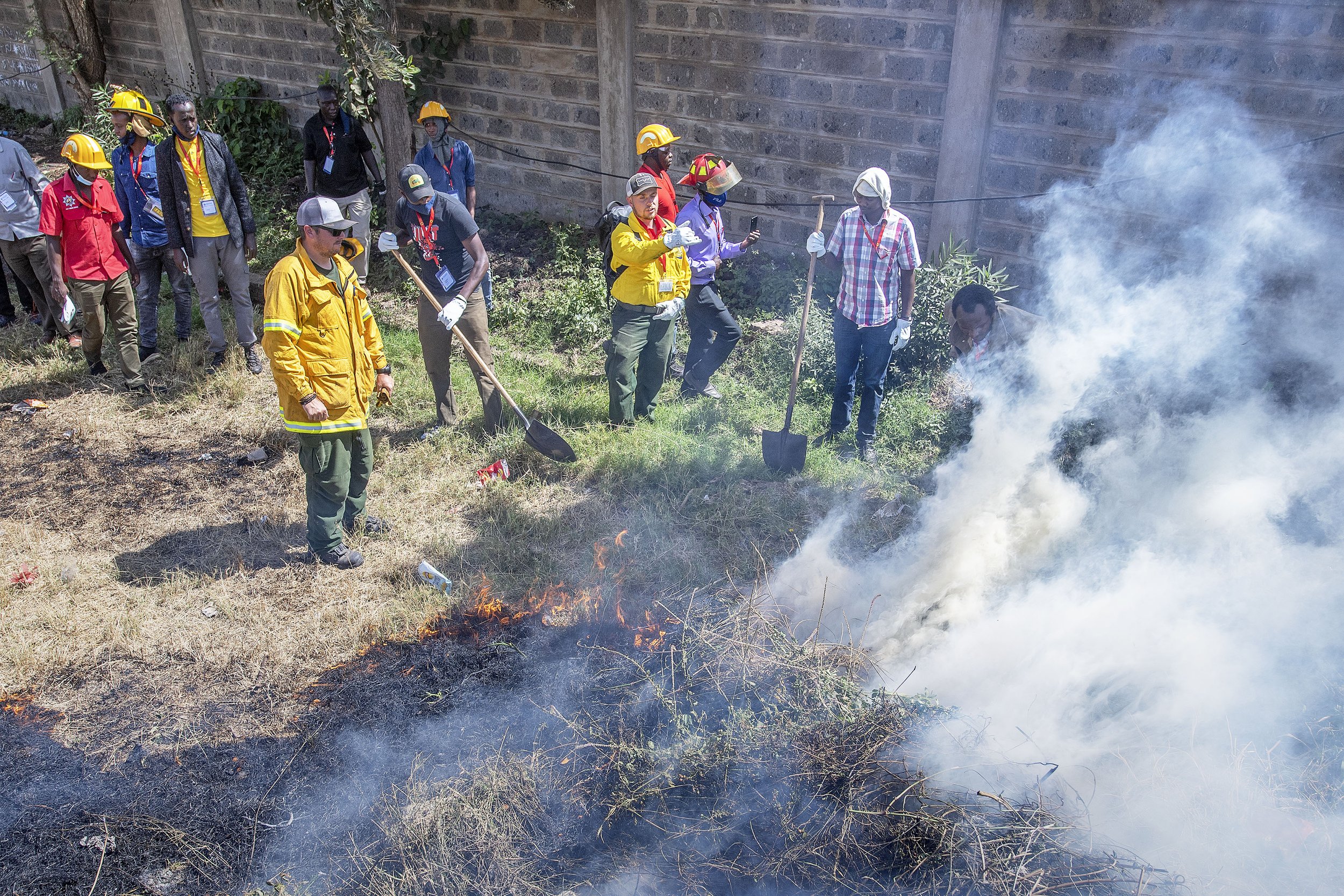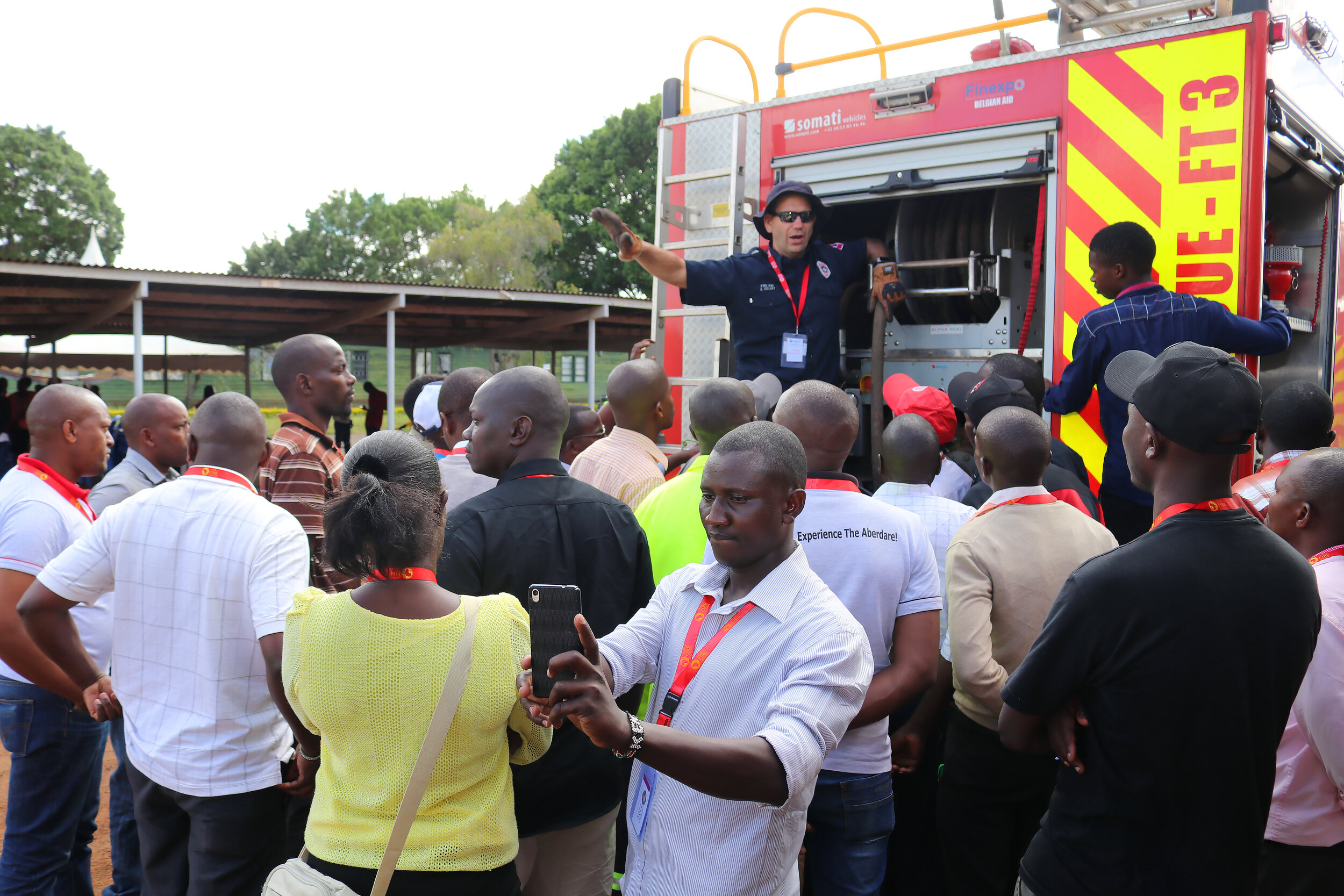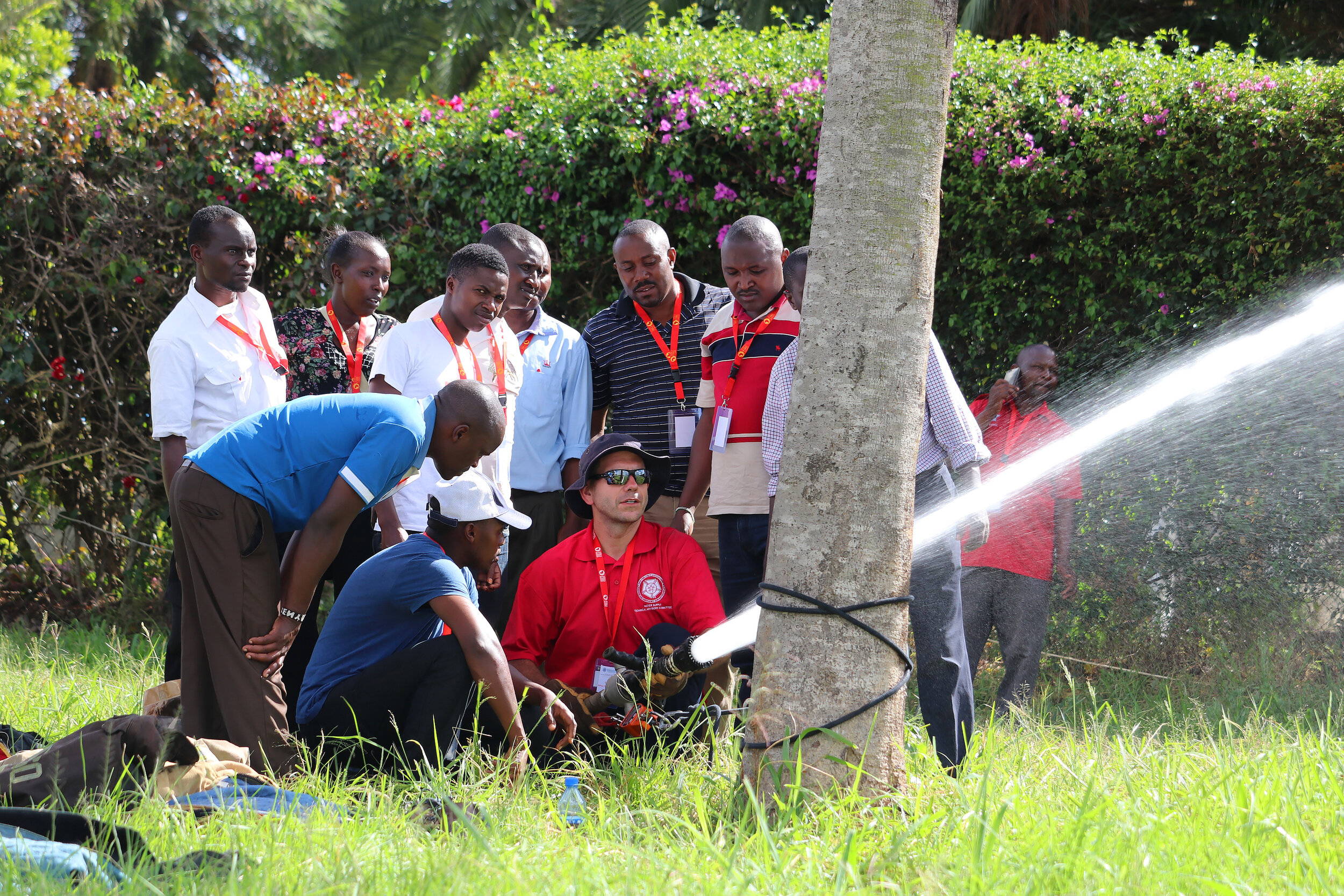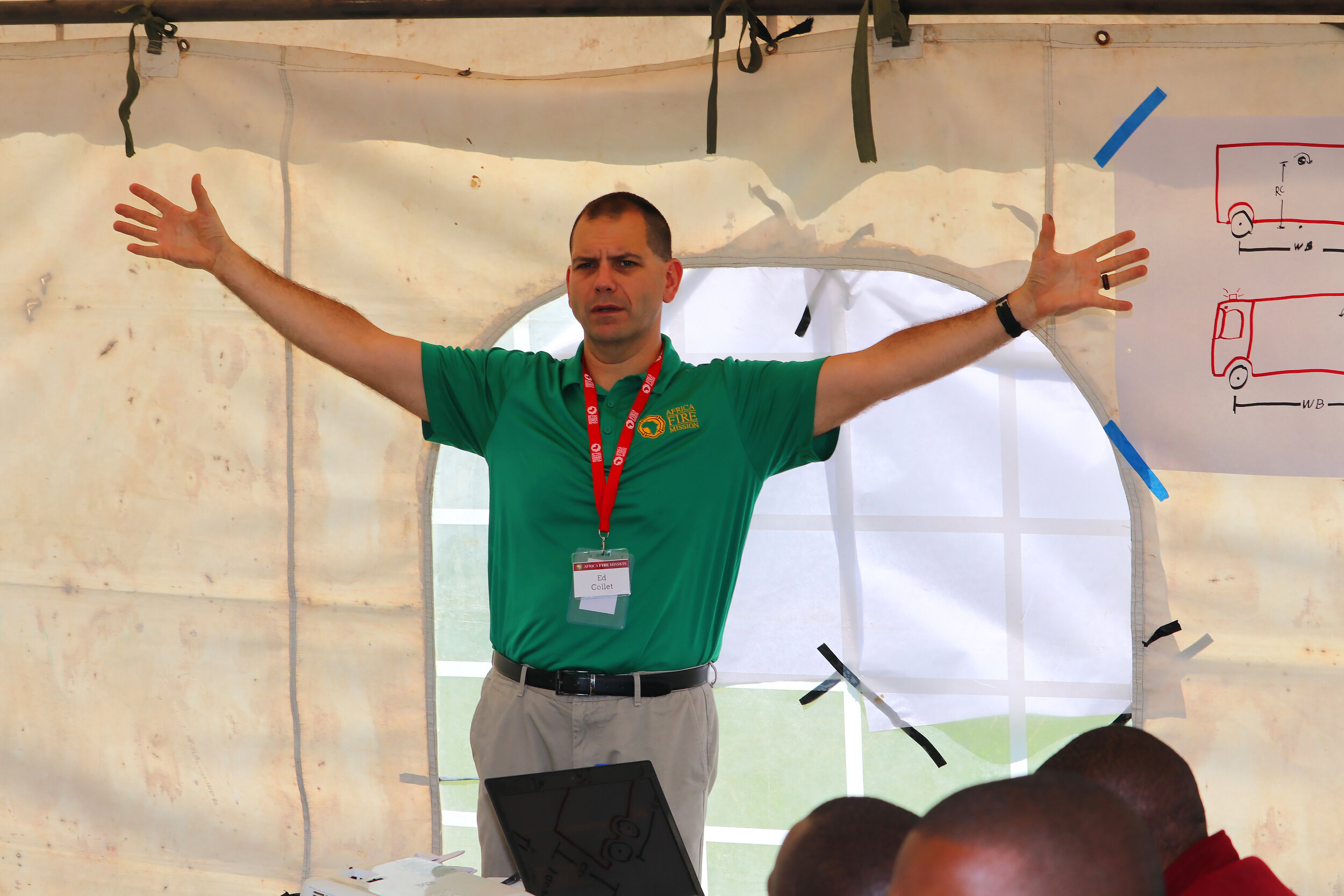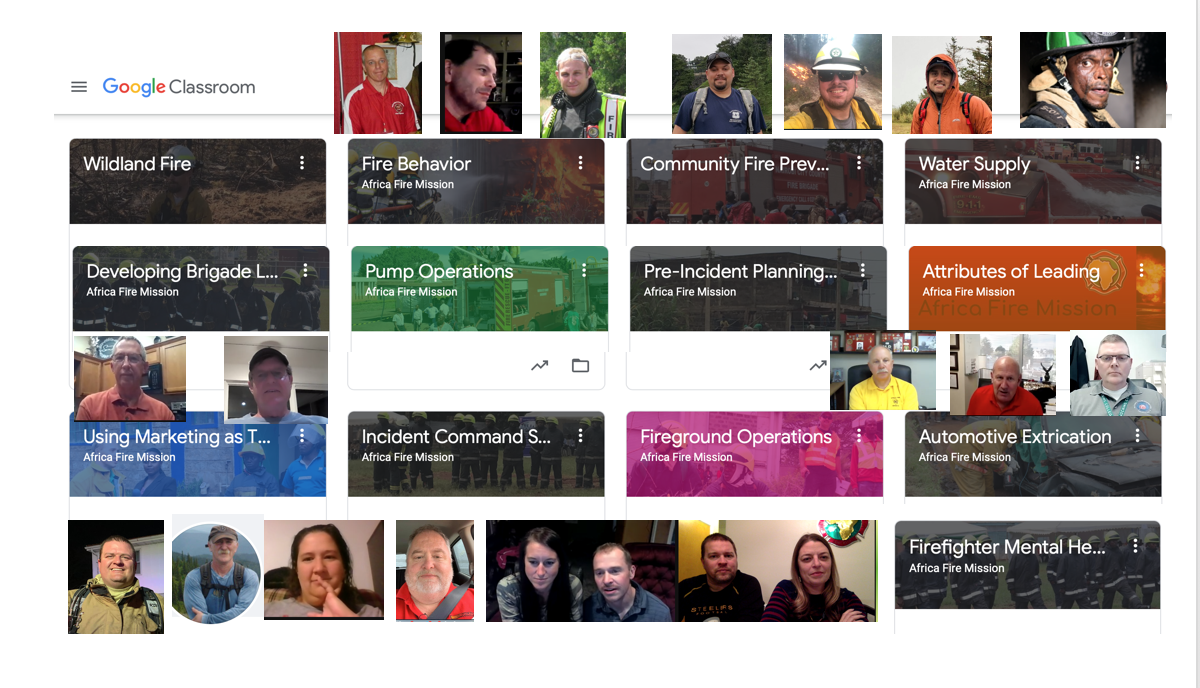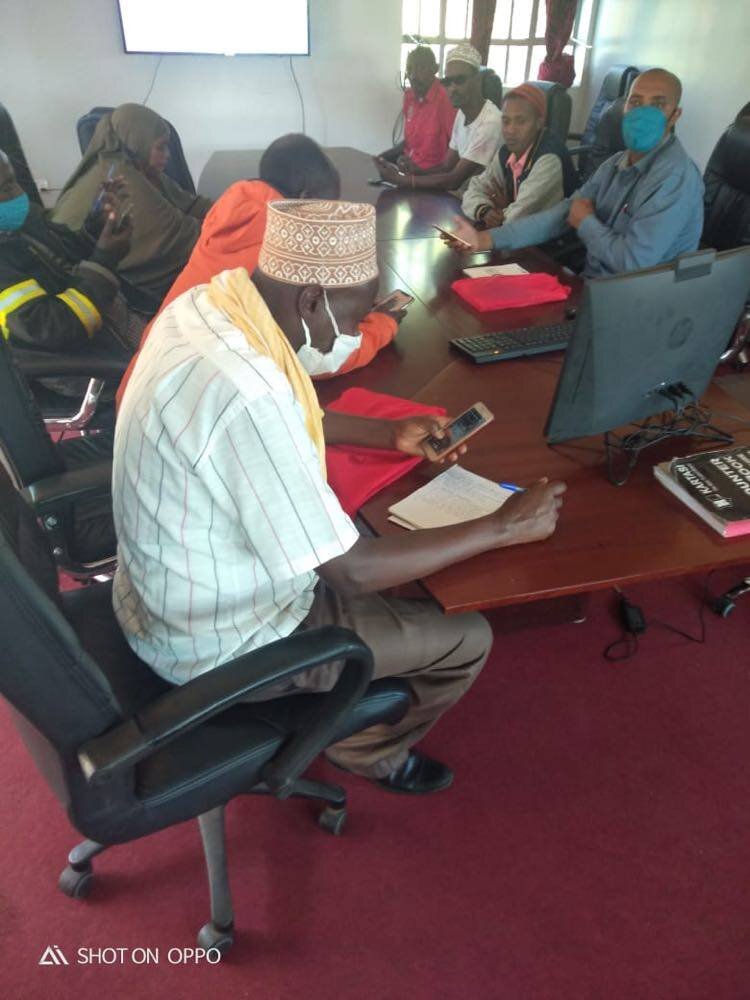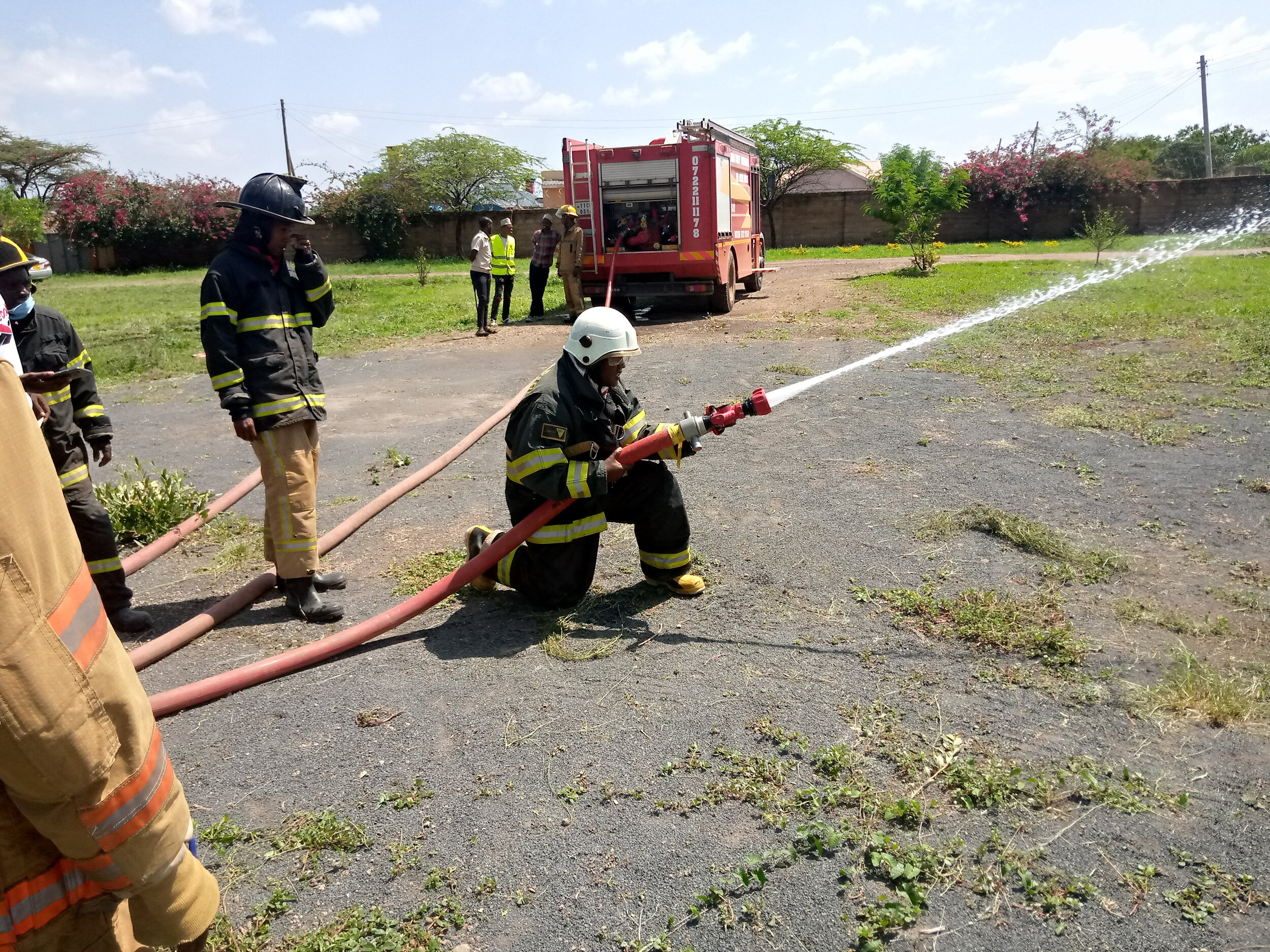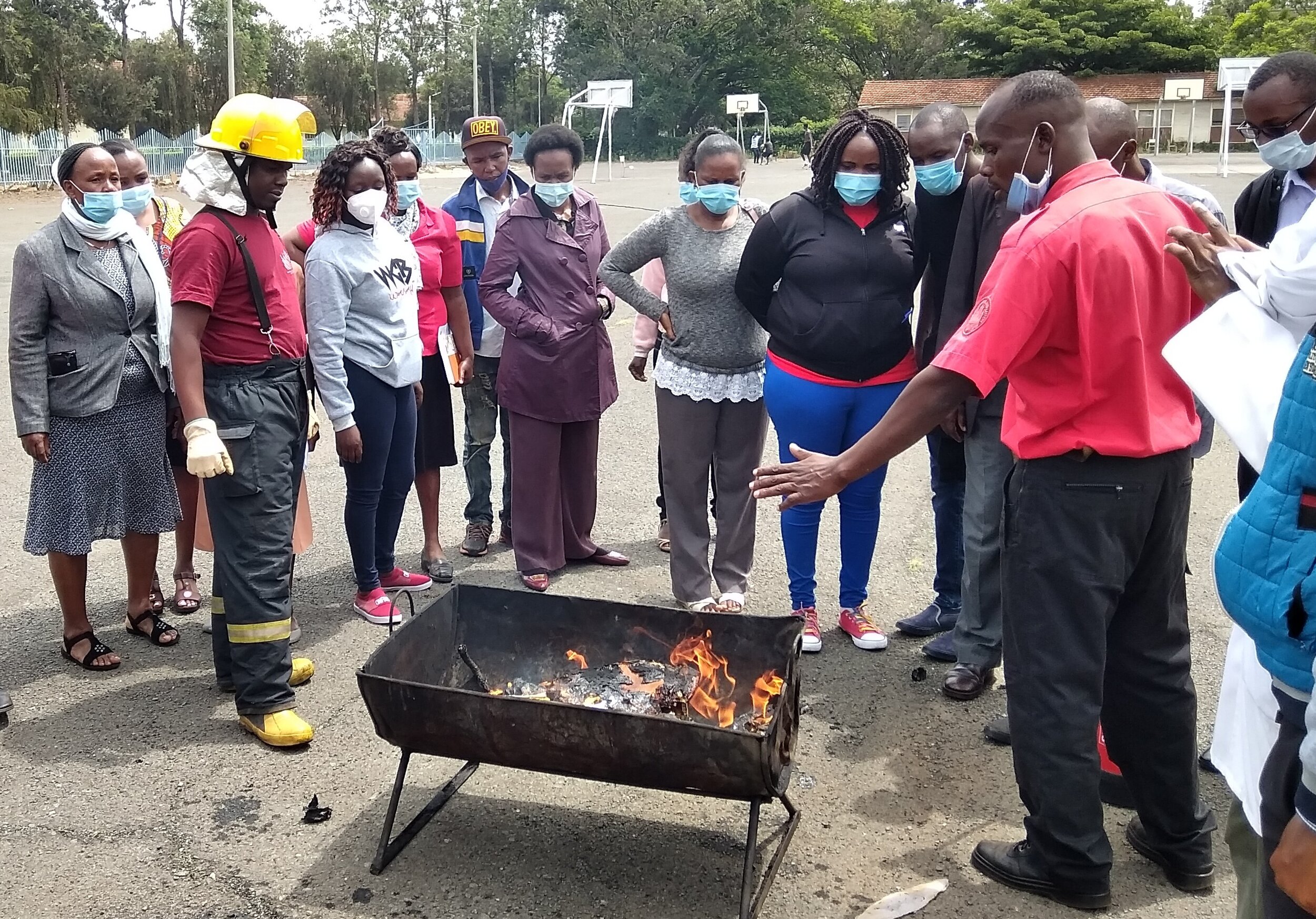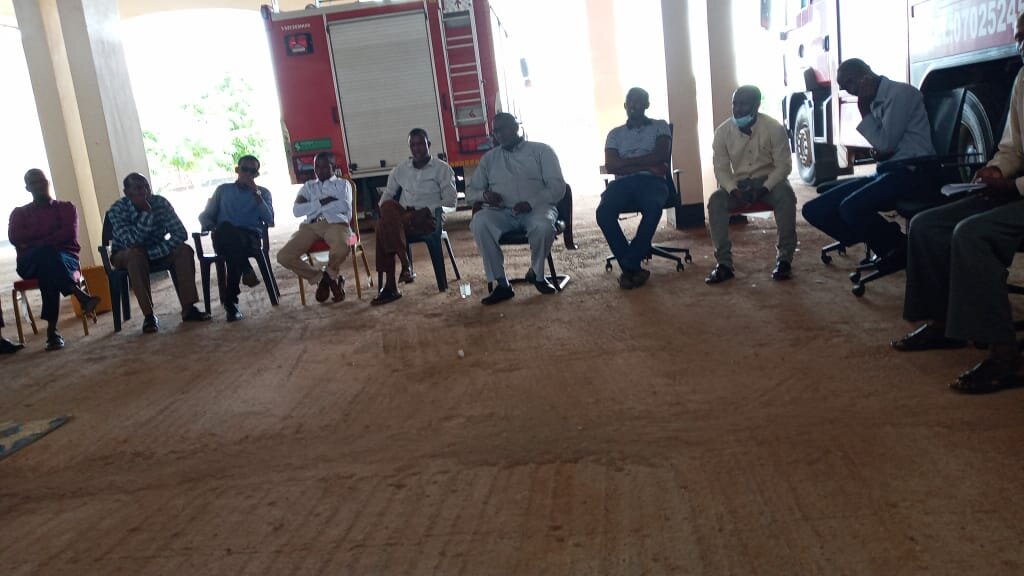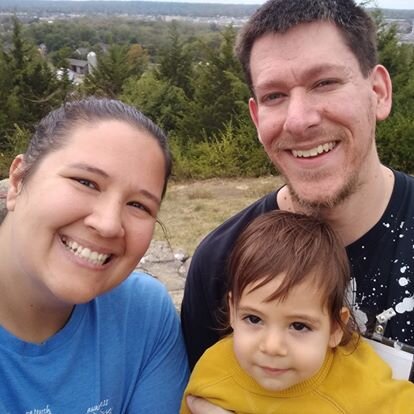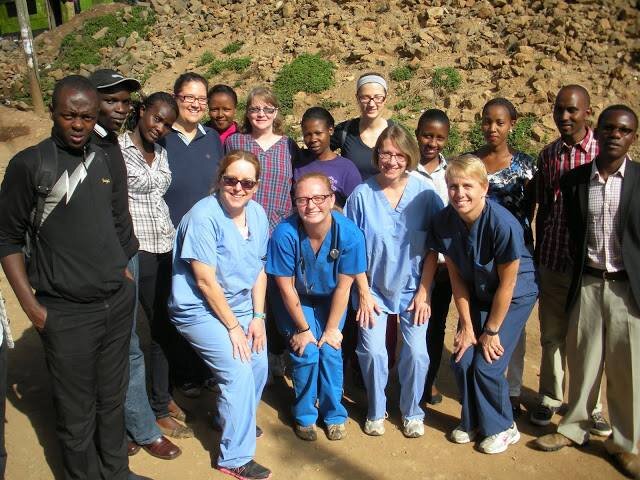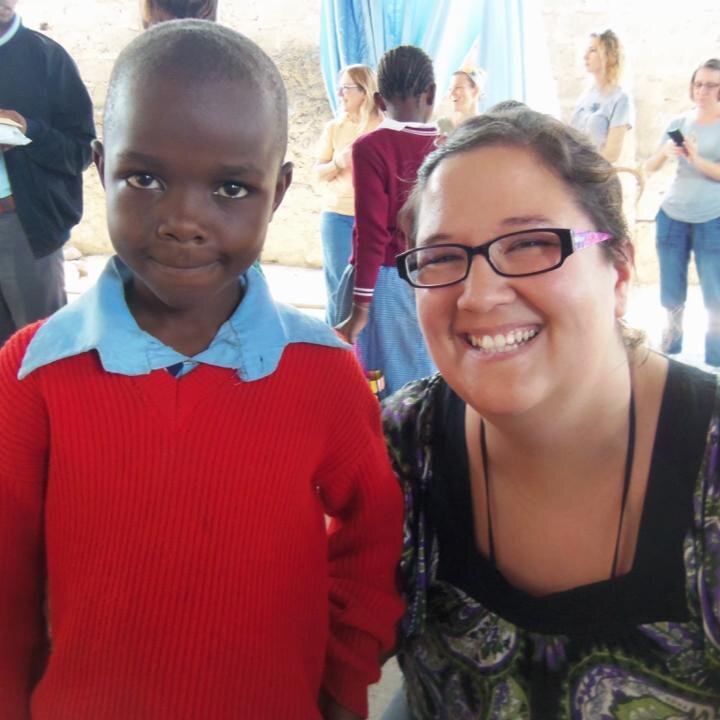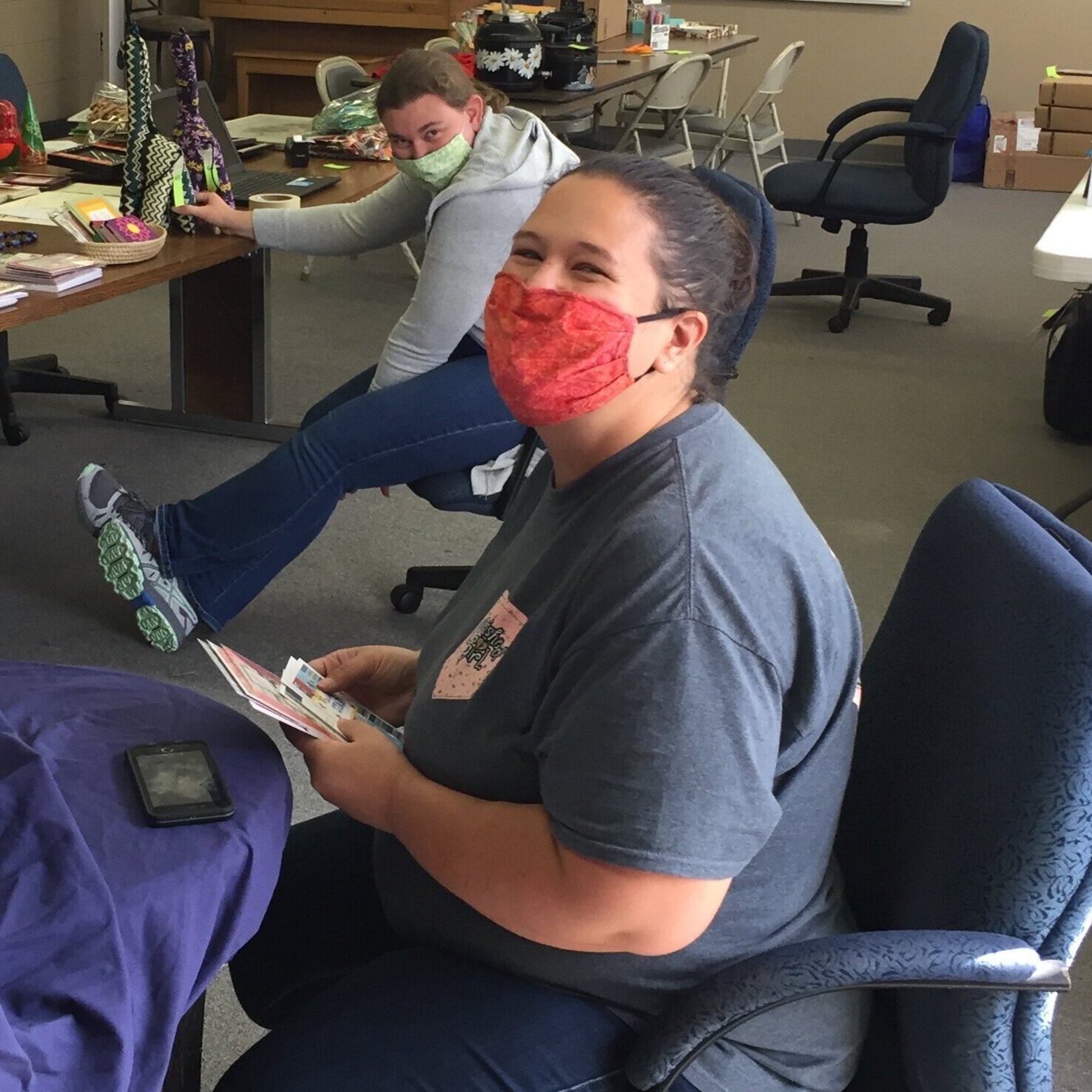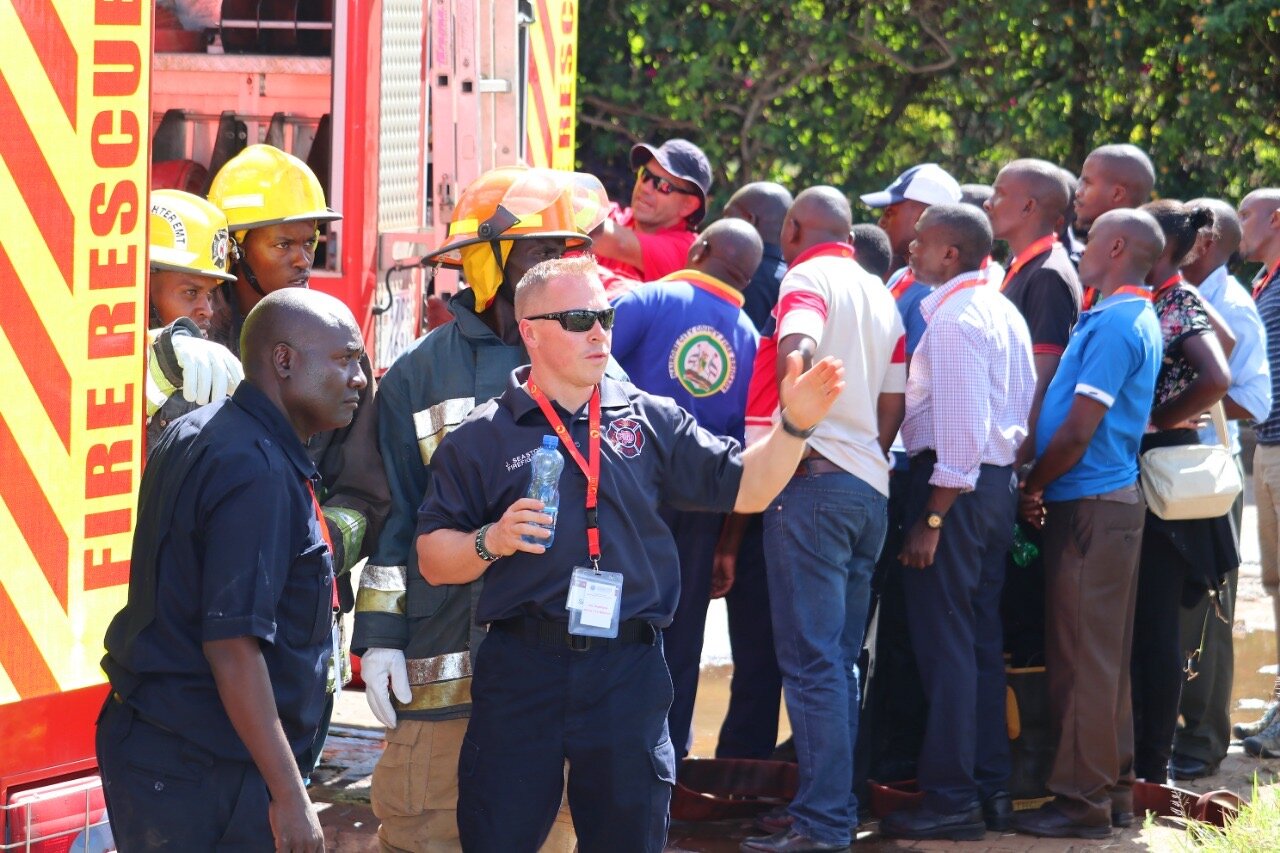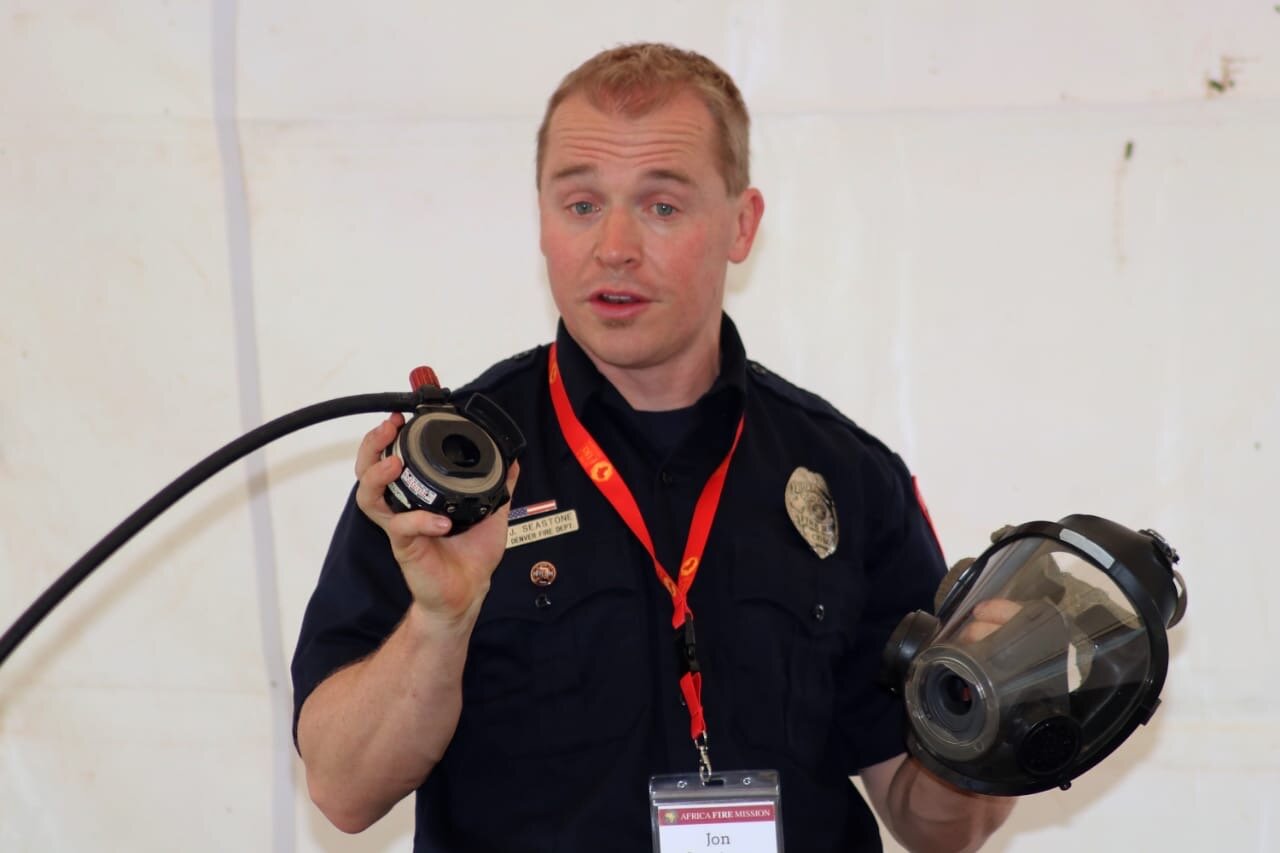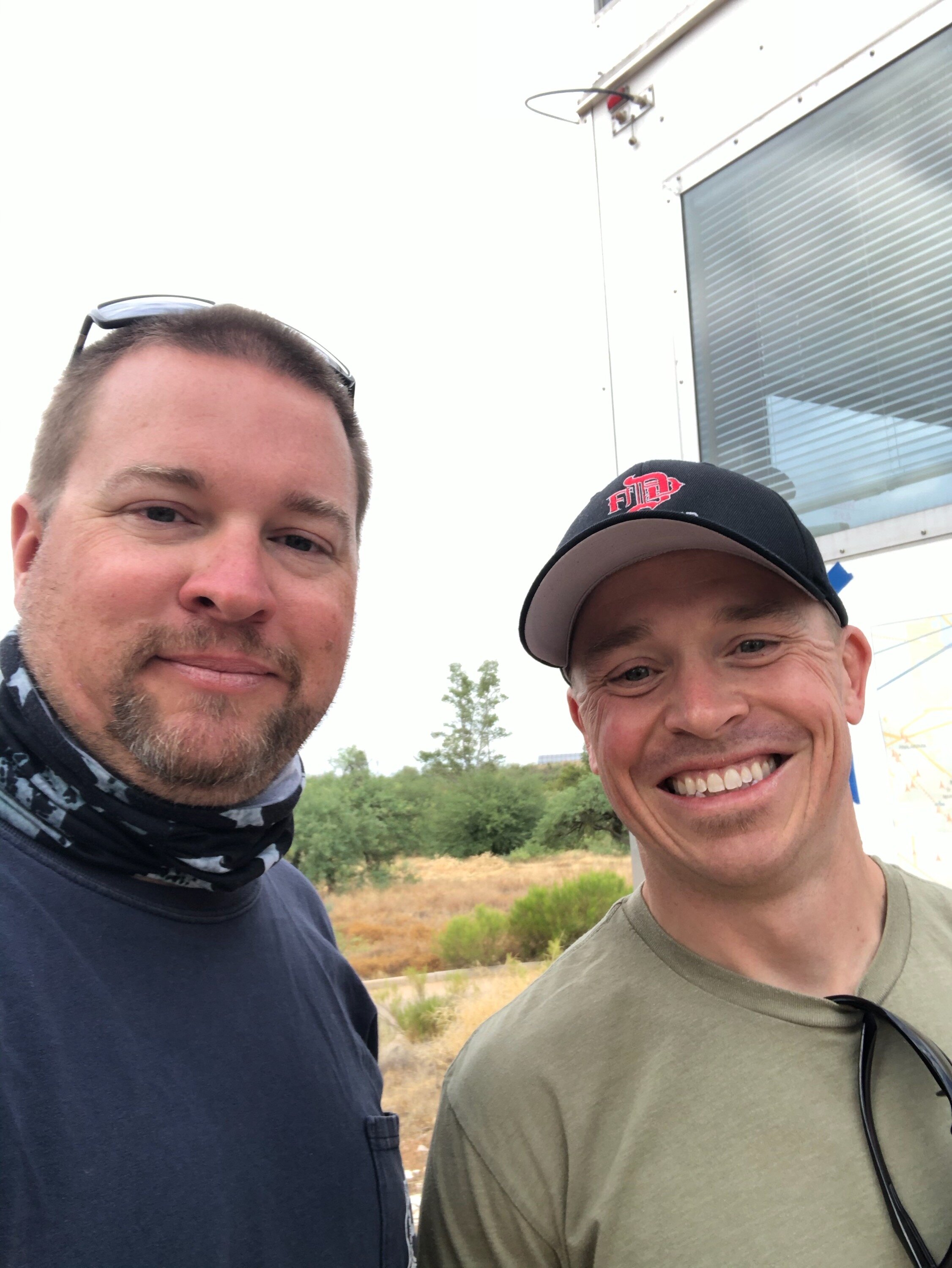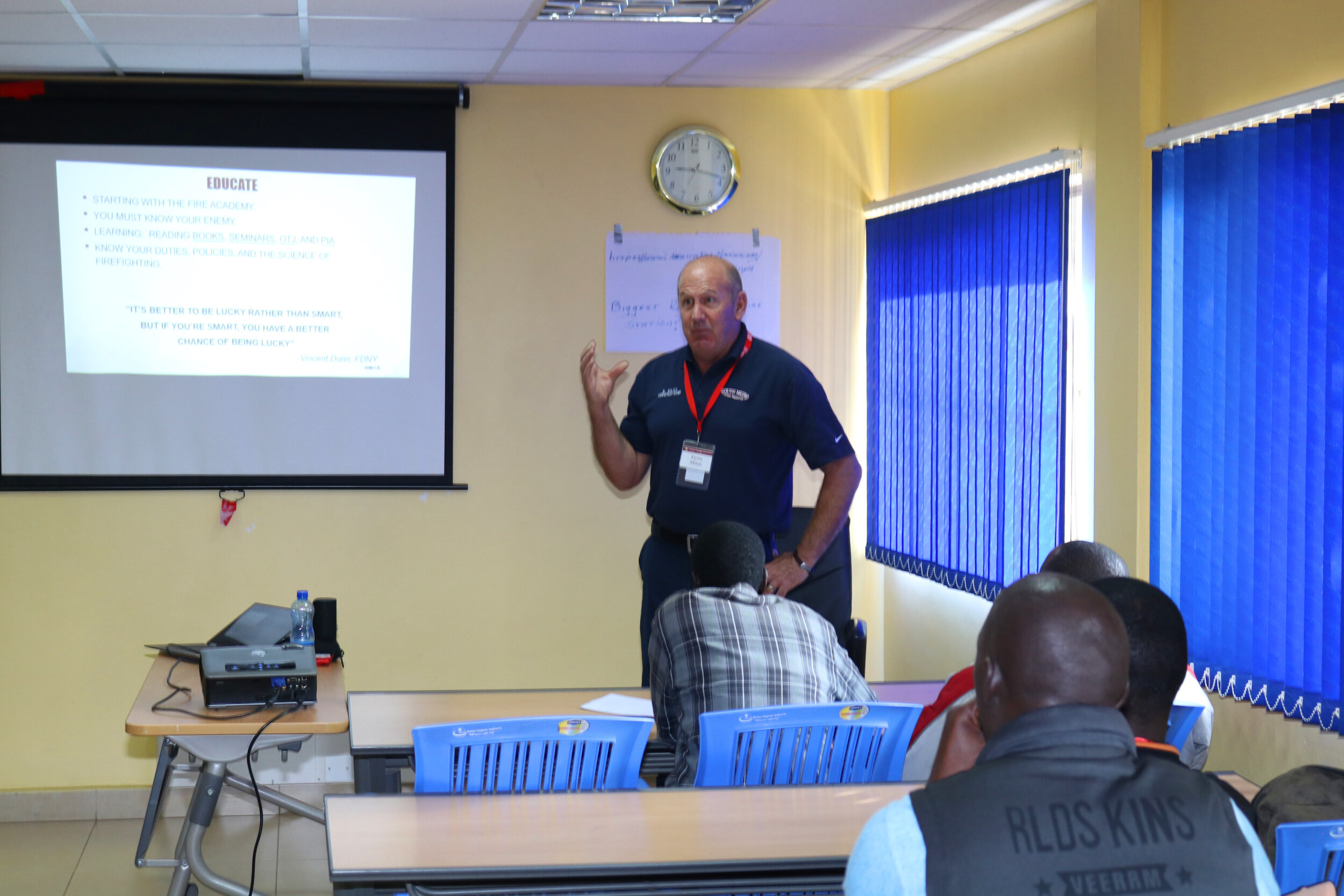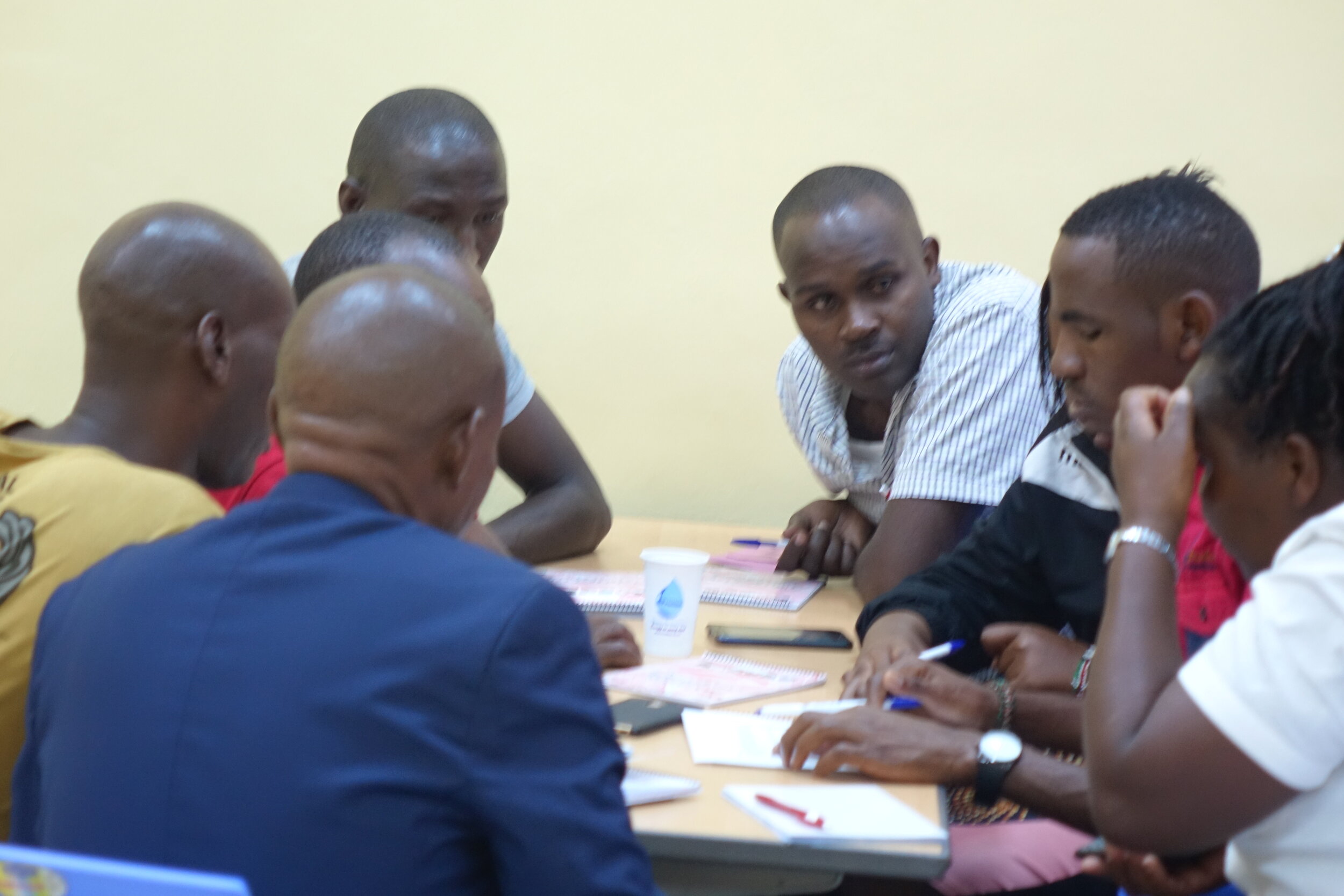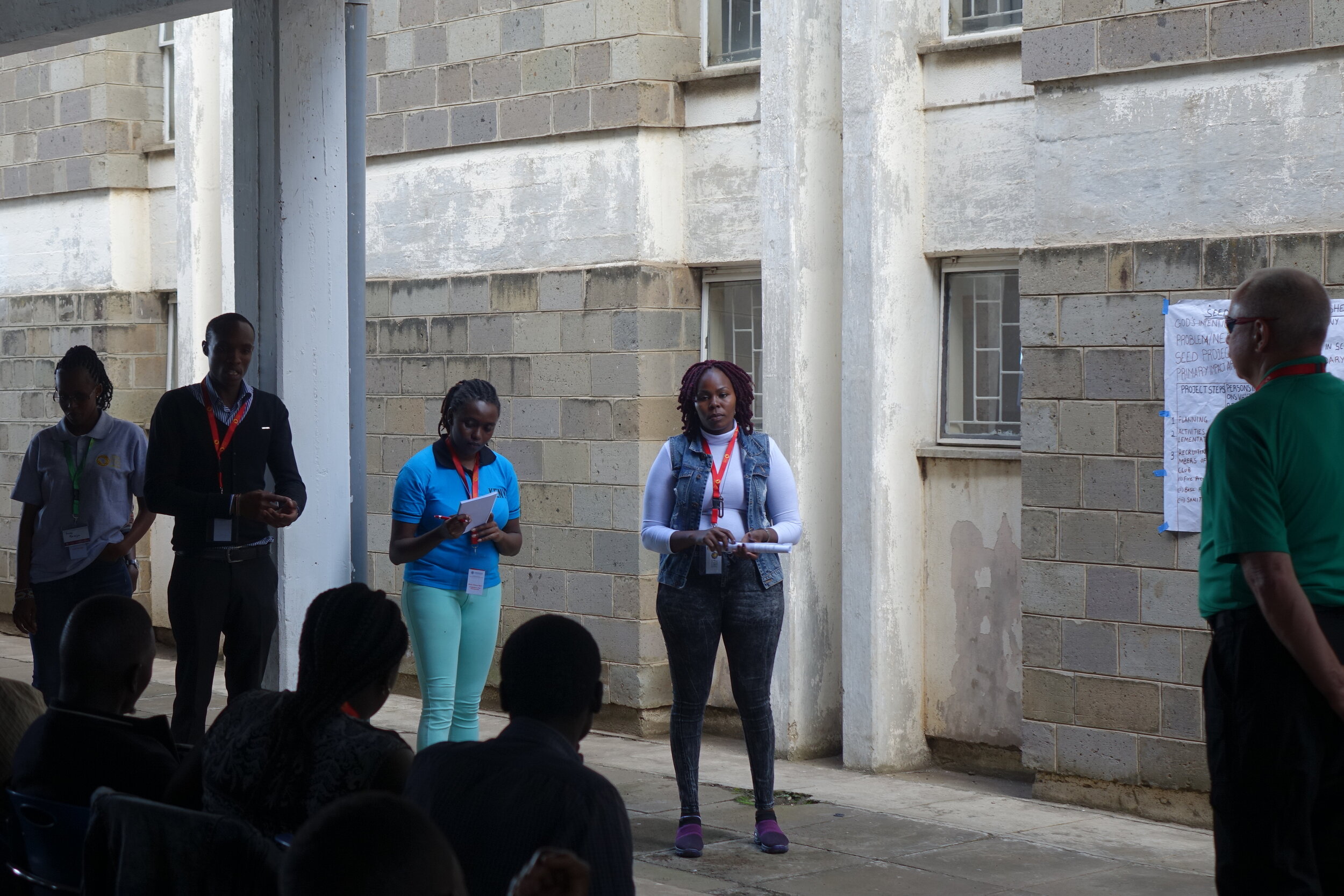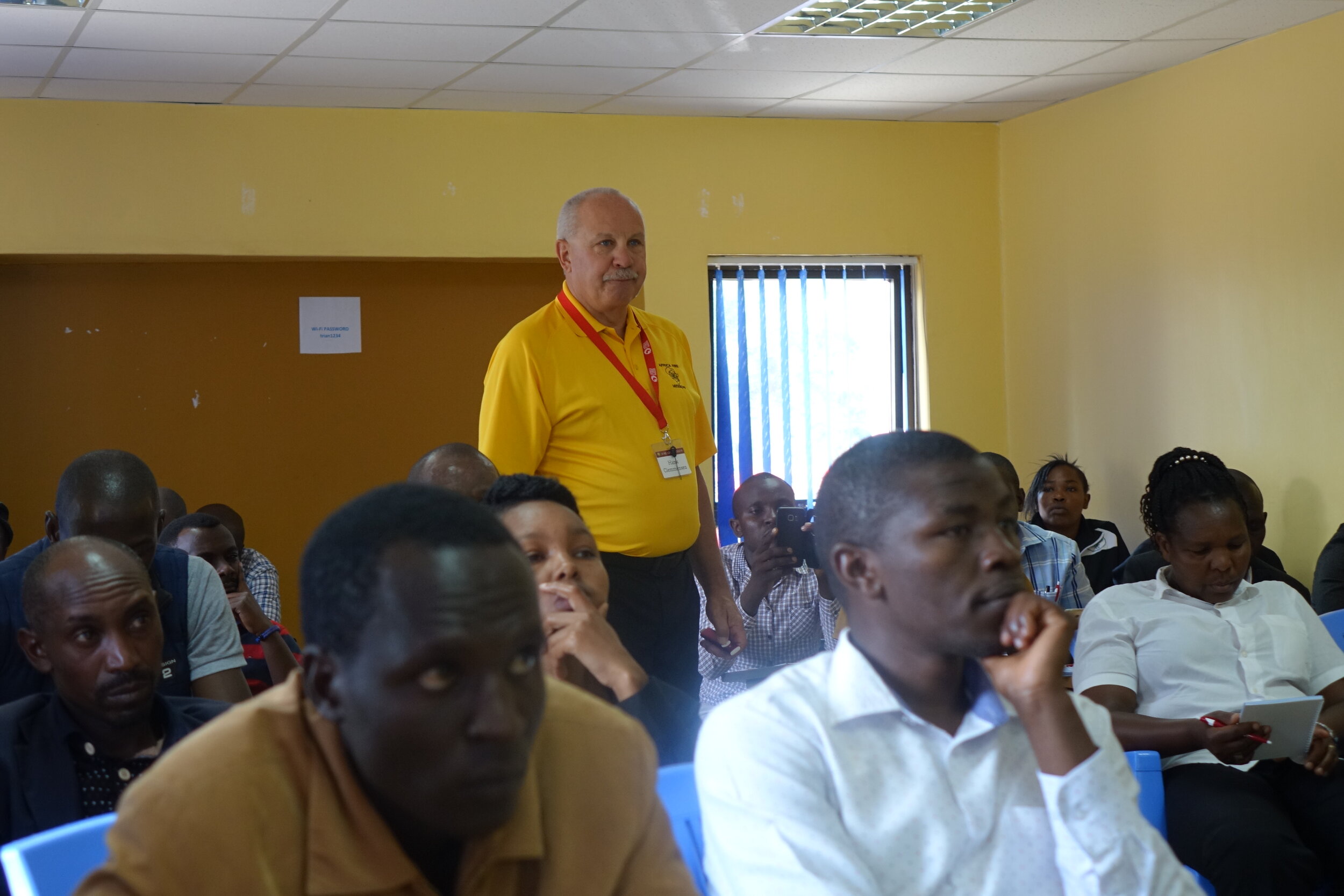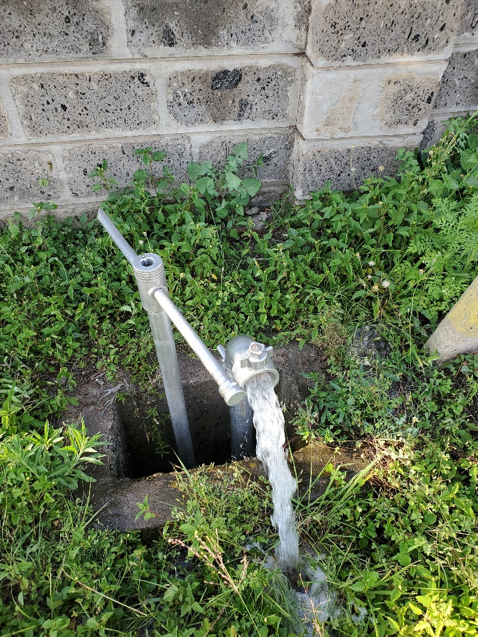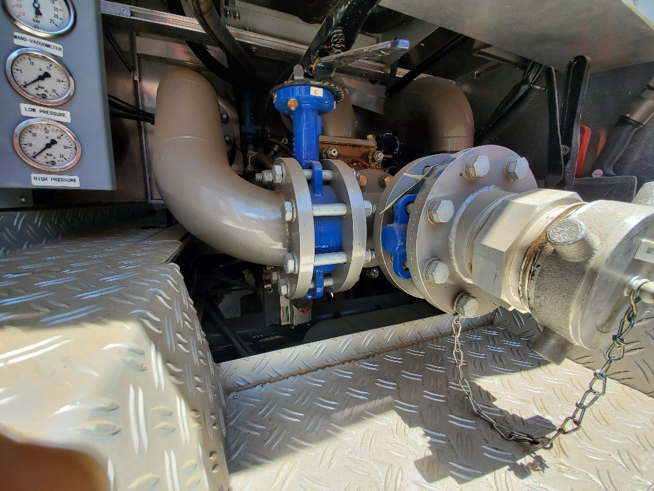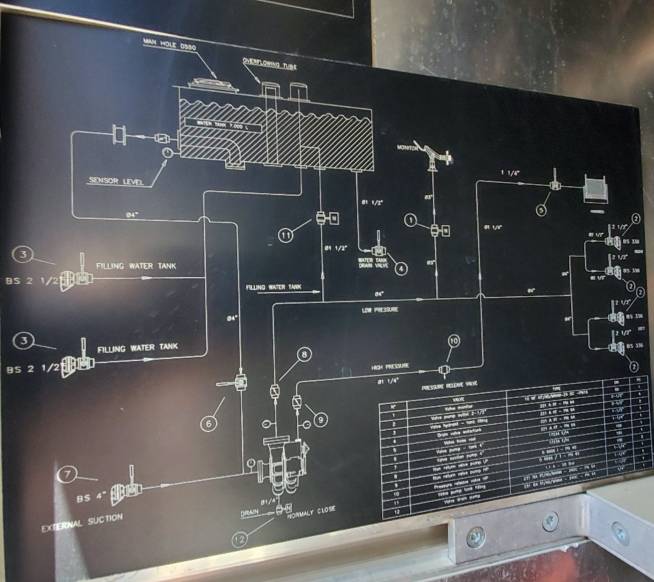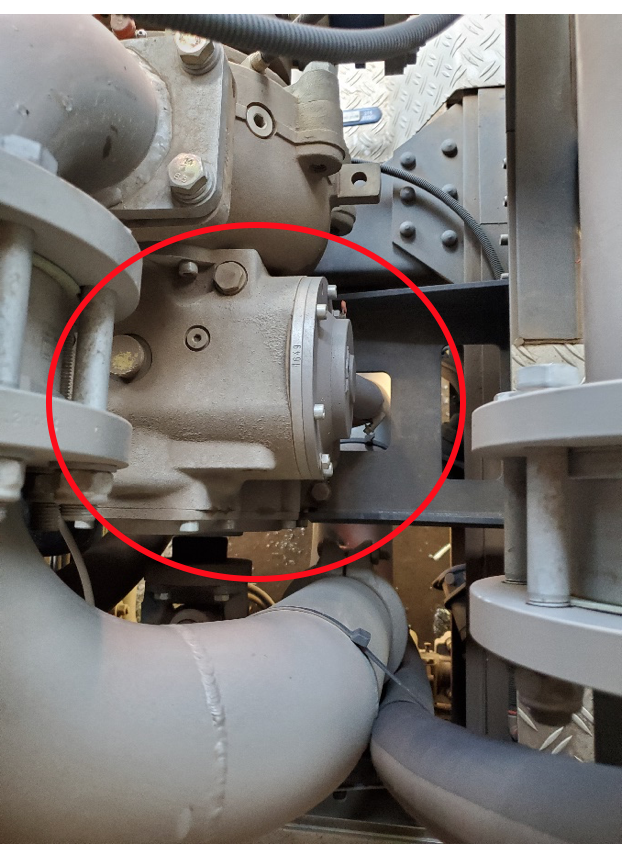In November, the AFM team travelled to Mombasa, Kenya, for this year’s annual EMS & Fire Symposium and Competition. During this week long event, over five hundred participants from Kenya and neighboring countries gathered for hands-on training, fellowship, and first responder competitions.
Africa Fire Mission Receives Grant from Hamilton County ReSource
Africa Fire Mission is excited to announce we have received the Waste Reduction Innovation Grant from Hamilton County ReSource! This grant will provide financial support for our operations assisting AFM’s efforts in reducing firefighter PPE and supply waste, as well as using gently used firefighter PPE to support firefighters in Africa.
2025 Chama Award Recipients: Volunteer and Instructor of the Year
Join AFM on a Mission Trip!
Africa Fire Mission invites you to apply for our Mission Trips! Each year, AFM brings teams of firefighters, EMS personnel, and other dedicated individuals to countries across Africa to train communities on firefighter and EMS skills and lifesaving community fire prevention lessons. Team members make a direct impact on the lives of countless people, join a community of incredible friends and colleagues, and make lifelong memories. Consider joining us in 2025 as our teams travel to Zambia and Kenya for impactful fire training trips. Apply today!
Recognizing the 2024 Kenya Fire and EMS Symposium Award Winners
In November, Africa Fire Mission worked with partners and collaborators around the world to hold the 2024 Kenya EMS and Fire Symposium and Competition. This Symposium featured firefighter and EMS trainings, leadership development, mental health awareness, community fire prevention trainings, and the signature EMS and Fire Competition. All of the classes were desinged to have immediate application for firefighters and EMS personel. AFM was espeically focused on leadership development in emergency services and the mental, physical, and spiritual wellness of first responders. AFM would like to recognize members of the fire service who are making a difference across Africa, as well as the award winners of the Fire and EMS Competition!
Africa Fire Mission Receives Motorola Solutions Foundation Grant
Africa Fire Mission (AFM) is pleased to announce that it has received a grant from the Motorola Solutions Foundation, the charitable arm of Motorola Solutions. AFM will use this grant to support the funding for our Fire and EMS Training Symposium and Personal Protective Equipment (PPE) Distribution in Kenya. This event serves as an incredible opportunity to train members of the fire service and develop leaders. AFM team members will also prioritize the mental wellness of first responders by continuing the development for health and mental wellness programs for emergency personnel.
AFM Reengages with the Fire Service in Zambia
Serving In Nigeria with FCT Fire Service and IHVN
It was great to be back in Abuja, Nigeria in January and early February!
An AFM team of six provided training to FCT firefighters, IHVN staff and partners from the “Committee of Stakeholders on the General Safety & Security of Cadastral Zone C00 Abuja FCT.” The training allowed the AFM team to assess the capabilities of the firefighters as well as gain a better understanding of the community’s perspective of firefighters. Training for the FCT Fire Service focused on enhancing fire response capabilities, promoting utilization of available equipment and tools for firefighting, and enhancing community awareness.
Team member Mike Kull elaborated that “we were able to provide quality training on a wide variety of topics - Breathing Apparatus, Ladders, Hose Drills - Firefighters from FCT Fire Service were eager to learn and we expect to see rapid and positive results from this training. We realize that development is a slow process but we have high hopes for the firefighters here in Nigeria.”
Head of Operations, FCT Fire Service, Engr. Adesina Abioye, stated that the training has updated Fire Service Staff with modern professional ways of rescue and firefighting, and served as a refresher course on fire prevention and administration for the Senior Staff who participated. “The importance of the partnership cannot be overemphasized; it has brought tremendous benefits to the partners and the stakeholders community. What would have cost the FCT administration a huge sum of money was made available at no cost due to partnership,” he said.
AFM also conducted a needs assessment to identify tools and equipment needed to further develop the FCT Fire Service and donated firefighting equipment. This equipment included firefighting coats, boots, gloves, suspenders and helmets for enhanced effectiveness in responding to fire incidents and saving lives, property, and critical infrastructure.
We are grateful that IHVN is committed to collaborating with FCT Fire Service to enhance the capabilities of the fire service and look forward to continued collaboration in Nigeria.
Celebrating our Volunteers!
On October 14, 2023 during our Annual Fundraiser, the Chama, Africa Fire Mission will honor volunteers Chief Bradley Banz and Chief Michael Kull.
Volunteer of the Year
Africa Fire Mission thrives on volunteers. Volunteers are at the heart of our organization. We have dozens and dozens of volunteers. We have volunteers from all across the North America, Africa and Europe that help allow AFM to serve on a daily basis. These men, women, firefighters, civilians and children are all a vital part of Africa Fire Mission being able to achieve its goals and objectives.
Chief Michael Kull – Volunteer of the Year
Chief Mike first joined Africa Fire Mission team in 2021 and has been all in with us ever since. Mike has participated in missions to Kenya and Malawi and facilitates AFM’s weekly virtual trainings. This past year, Mike stepped further into leadership co-leading our Malawi training trip! Mike just get’s it. He understands that the fire service in Africa is limited in physical resources and rich in people resources! Mike uses his creativity to help solve problems and helps the fire service advocate for what they need. This week we learned that the Zomba, Malawi fire brigade received its first uniforms from their local government as a result of the advocacy that their team learned from Mike. Mike’s dedication to facilitating our online trainings and lead to steady growth of our trainings from 60 participants a week at the beginning of 2023 to more than 100 participants a week now.
Mike fully embodies our mission to train, empower, support and encourage firefighters in Africa and his leadership has allowed us to continue to grow!
Thank you Mike for all that you have done for Africa Fire Mission! We are looking forward to serving with you for year’s to come!!
More about Chief Michael Kull: Chief Michael Kull is from Pennsylvania where he recently retired as the Fire Chief for the Valley Township Fire Department, Forest Fire Warden for Weiser State Forest and as a Township Supervisor for Valley Township. As a volunteer firefighter with over 25 years of experience, Michael has learned creative strategies for meeting his community’s needs for fire and rescue services.
Instructor of the Year
When Africa Fire Mission travels with a team to provide training in Africa or other parts of the world, our team members volunteer their time, talents and treasures to provide world class training to our partners. Our instructors undergo training in advance of the trip to prepare of the mission and prepare the lessons that they will teach in our week long fire training events. We are fortunate to have many instructors return year after year who continue to build each year on the training that they have been providing as well as to build strong relationships with firefighers and our overseas partners.
Chief Bradley Banz, Instructor of the Year
Chief Banz heard about AFM from our partner at Missions Of Hope International after providing CPR and first aid training there. Brad’s been involved with AFM since 2015. Brad has traveled with AFM on missions to Kenya, Zambia, and Malawi. Brad has been instrumental in the development of our Community Health Evangelism curriculum on Fire Prevention and Safety which has impacted millions of lives across Africa. Brad notices needs and responds making sure that curriculum developed for classes he teaches meet the needs of the fire service. This past year, he developed a Hazardous Materials class for firefighters in Africa after seeing the dangers firefighters were exposing themselves to attempting to respond to some Haz Mat incidents.
Brad encourages our team members and advocates for the firefighters. He takes time to get to know the firefighters we are serving and what their needs are. His heart for Africa is abundantly clear!
Thank you Brad for serving with heart and passion! We are grateful to have you on our team!
More about Chief Bradley Banz: Chief Banz is a firefighter with over 38 years of experience. Brad retired as a Captain for the Wichita, Kansas Fire Department and retired as Fire Chief from Colwich Kansas. Brad continues to serve his community as a volunteer firefighter in addition to training firefighters in Africa.
Interested in volunteering with AFM in administrative roles or as one of our international instructors?
Malawi: How the Future of Their Fire Service is Bright
By: Brad Banz
I was blessed to be a part of the recent AFM team that travelled to Malawi in June. During our trip, our team split up to visit all four fire brigades in the country. We shared our knowledge and provided equipment to better allow them to execute their jobs.
I have been working with AFM, almost since their beginning, making my first trip to Kenya with Dave and Nancy Moore in 2015. I have been travelling to Kenya since 2009, working in the Mathare Valley with church mission groups. My interest in the Kenyan fire service was boosted after a trip to Kenya was cancelled in 2013, due to a victim of a fire in the airports arrival hall the day before we were to arrive. What does this have to do with Malawi, you might be asking? In terms of resources, the Malawi fire service is where Kenya’s was 10 years ago.
As I alluded to earlier, Malawi has four fire brigades for a country of 18 million people. The firefighters have no uniforms, their apparatus and PPE are donated from other countries. From what I could see, less than half of the apparatus’ were in working condition. The fire brigades do not have their own stations, but are instead collocated within public works facility, using whatever leftover space is afforded to them. While the state of the fire brigades are saddening, they are not surprising. Malawi has the 12th poorest household income in the world.
Something that also stuck with me was an interaction I had with one of the firefighters. While firefighters were building a wood fire to heat the cooking oil for our fire prevention demonstration, one of them shared with me that his wife woke up every morning at 5, built such a fire, heated water, and put in a basin so he could bathe and got to work. This is an example of how little their firefighters are getting paid in this country. Living in homes without hot water is a struggle very few of us can relate to- and it reminds me of how blessed I am to have the resources I have. Despite these limitations, like most firefighters, they get the most they can out of the resources at hand.
Zomba firefighters stopped a fire in a small attached building from spreading to a much larger one. The Lilongwe Chief was summoned to city hall to answer for a fire that burned the top floor of a six story building. His firefighters couldn’t get to the sixth floor because they didn’t have the hose. Using what they had, they confined it to the top. What Malawi does have is firefighters who are eager to do the job. This is the best resource any fire brigade can have.
After visiting both, Malawi and Kenya are very different countries with different challenges. Our team all talked about how we could fix the problems, but it is a complex issue that will require that both us as westerners and the Malawians both quit creating a mindset of dependency and start helping them to develop. The changes that we have seen in Kenya are what the Malawi fire service can use as a benchmark to learn from.
Serving Firefighters in Malawi
June 5, 2023 a team of eight instructors for Africa Fire Mission set off from their homes in the United States, Germany, and Kenya. Our team members come from diverse experiences in the fire service.
We set off, with most team members having more than 30 hours of travel, to serve the firefighters in Malawi. There are 4 fire brigades in Malawi - Mzuzu, Lilongwe, Zomba and Blantyre and we were able to provide training at each station. After arriving in Malawi - our team divided into 2 smaller teams and traveled to each city.
Training topics and practical application was customized for each department and included: hazmat, rope rescue, hose management, ladders, interior search and rescue, CPR, first aid, and community fire prevention. While they were in Malawi the team went with the Fire Brigade to nearby schools and practiced showing the children fire safety!
Our team found it encouraging to see how the firefighters had furthered their trainings form our work in 2022 and improved their skills. Firefighters in Malawi work so hard and deserve the respect that they are gaining from their communities! Chief Mike Kull said, "It is such a pleasure working and training with these firefighters who are so dedicated to their profession and so willing to learn and train." Additionally, we were able to donate 15 sets of PPE to the firefighters this year and are making arrangements with the help of Malawi Goodlife to send more equipment to the fire service from Germany.
Chief Mike Kull trained in Blantyre and Zomba and blogged about his experience. If you’d like to read more about AFM’s mission to Malawi, check out Chief Kull’s blog: Far Off Chief.
Recognizing our Volunteers
On October 22, 2022 during our Annual Fundraiser, the Chama, Africa Fire Mission was pleased to honor Judy Johnson and Howard Cohen.
Africa Fire Mission thrives on volunteers. Volunteers are at the heart of our organization. We have dozens and dozens of volunteers. We have volunteers from all across the North America, Africa and Europe that help to make AFM run on a daily basis. These men, women, firefighters, civilians and children are all a vital part of Africa Fire Mission being able to achieve its goals and objectives.
Judy Johnson – Volunteer of the Year
Judy has been critical to helping developing AFM into the organization that it is today. Judy was the person who introduced Dave and Nancy to Missions of Hope International and she was instrumental in ensuring that we had a solid plan for taking team members to Africa - from training team members to helping to write our application Judy prepared us to do the work we do. As a board member to AFM, Judy has helped to ensure that AFM was connect with other organizations around the world so that we can collaborate with others to do our work.
Thank you Judy for all that you have done for Africa Fire Mission! We hope you’ll continue to enjoy your retirement!
When Africa Fire Mission travels with a team to provide training in Africa or other parts of the world, our team members volunteer their time, talents and treasures to provide world class training to our partners. Our instructors, undergo training in advance of the trip to prepare of the mission and prepare the lessons that they will teach in our week long fire training events. We have been fortunate to have many instructors return year after year and continue to build each year on the training that they have been providing as well as to build strong relationships with firefighers and our overseas partners.
Howard Cohen, Instructor of the Year
Howard has been pivoting and helping to grow AFM since he signed up for his first trip in 2020 - which turned into a virtual trip/training. Howard then went to Kenya with AFM in 2021 and signed up to coordinate our weekly online trainings. With Howard’s leadership and planning, we have grown from an average of 16 participants a week in 2021 to 65 weekly participants in 2022! Howard is headed back to Kenya with AFM in November 2022 and is looking forward to reconnecting in person with those he has been building relationship with. Check out what Howard has to say about being part of AFM below!
Interested in volunteering with AFM in administrative roles or as one of our international instructors?
The Fastest Two Weeks
By: Chief Mike Kull
After months of planning and meetings online, our team arrived in Blantyre, Malawi and it was stunningly beautiful. I’ve worked and traveled in East and Southern Africa but this country stood out to me. We sat down for a meal together to have our first face to face meeting. Breaking bread together is an important part of what we do here. Most of us knew each other and had worked together before but there was a new member of the team. With such a small team, we were going to be like family before we left. We had two days per city in three major cities while we were there and we were anxious to get going.
Our two days in the first city, Blantyre, flew by. We didn’t really have a plan going into it but our team quickly adapted to teaching together like we had done this a thousand times before. We tried to jam as much as we could into these two days and it was a real success. How do we know that? As we were having our team debriefing during supper the second day, we got a message that there was a fire reported in a slum area of the city. A while later we received another message saying that they had successfully extinguished the fire using some of the tactics that we had taught them. What great feedback for our two days of training.
Our travel days allowed us to decompress from the crazy few days of thinking on our feet. We toured the Namikango Mission, one of the AFM mission partners in Malawi. They are doing some great work in the community with a Maternity Clinic, a Discipleship Training Institute, a plantation, and Coffee Farm and Roastery. While we weren’t scheduled to visit the Fire Station in Zomba, we stopped in for a quick visit. They were extremely lacking in resources but we were very encouraged by the positive attitudes of the firefighters working there.
Our next two days of training in Zomba go very quickly again with great success. We weren’t planning on doing any medical training but saw a need after arriving to teach some life saving skills in CPR and bleeding control. We spent some time teaching vehicle extrication with hand tools. While on a break, we began going over a set of hydraulic extrication tools that had not run for the past thirteen years. With some work, will power, and a few tools we had packed, we got the power unit running and the tools are now on the truck ready to be used out in the community. We left Zomba feeling like we had made a real difference. That was the reason we were all there.
Our next travel day took us to Lake Malawi. The Lake is such an incredible resource for the country and no trip here is complete without a visit. We only had a few hours by the Lake but it was a good chance to recharge our spirits and prepare for our final two days of teaching.
Our last two days of training were in the capital city of Lilongwe. Even in the Capital, they struggle with having the equipment they need to serve the city. There was only one functioning fire truck and it was on loan from the airport. What is so inspiring working in Africa is how dedicated these men and women are to serving their communities despite the lack of resources they have. While we were there we had a unique experience that was not on the schedule. We ended our training early our first day because the Fire Brigade had to standby at an Africa Cup of Nations (football/soccer) qualifier game between Egypt and Ethiopia. We were invited to come along and we quickly agreed, riding with the firefighters on the Engine to the stadium (with lights and sirens at times). Once we were there we split up into teams around the stadium. It gave us a chance to interact with the firefighters and work side by side with them. It was mostly uneventful but still an unforgettable experience. We wrapped up our last day of training with some extrication training and a live fire.
Our final day in Malawi was spent out in the villages with our mission partners at e3 Partners. They are doing some great work with sustainable farming and drinking water wells in the rural areas. We even got to do some fire prevention training in a remote village. Our Fire Safety Advocate, Jose, from Kenya did an awesome job engaging everyone in the village.
I am humbled and honored to say that I am a part of Africa Fire Mission. We all did this for different reasons. All of us want to share the knowledge and training that we have learned in the Fire Service with these developing nations. For me, it is also more of a calling. For me it is a way to carry out the Great Commission that was given to us in Matthew 28:19 “Go therefore and make disciples of all the nations…”
Working for Africa Fire Mission is a great way for anyone to grow mentally, emotionally and spiritually. You will be inspired as you work side by side with instructors from around the US and the world as well as with these amazing firefighters in developing countries. You will leave with your spirits raised, a new enthusiasm for firefighting and more than anything, a different perspective in life and on the world as a whole.
About the Author:
Chief Mike Kull has been serving his local community in rural Pennsylvania for 25 years. Chief Kull serves as Fire Chief and Administrator of his local volunteer fire department as well as serving as a local elected official and has served in various government roles for his entire career. He is also a Forest Fire Warden with the PA Bureau of Forestry and serves on his church council
Experiencing Kenyan Firefighting First Hand
by Josh Bardwell, Glimer Texas
As an American firefighter, I have always had some level of awareness of how fortunate I have been to have decent equipment, funding, and training provided to me in my volunteer and career fire agencies. With that said, I have oftentimes fallen into the all-to-common quagmire of being jealous of what other departments or agencies have that mine did not and feeling a level of frustration that I now feel guilty of. Sure, my home department and agency could enhance our response capabilities with more funding and training than we have, but after my time in Kenya with Africa Fire Mission (AFM) I realize that I have had it pretty darn good.
I came home from Kenya with a renewed perception of the fire service as a whole and the part I play in it thanks to the camaraderie of my fellow AFM instructors and the selfless students we met.
From walking through the Nairobi slums that are prone to fatal fires, to sitting on a football pitch discussing Wildland Urban Interface issues with our students, it quickly became apparent that many of our Kenyan counterparts are dealing with fire service issues that we rarely encounter in the United States. Pre-trip research prepared me to address typical firefighting issues like unreliable water supplies, staffing deficits, need for pre-planning for incidents, and implementing public outreach programs.
In less than two days in-country conversing with our Kenyan colleagues, I was exposed to the hard truth: that most of those firefighters face more danger from the public than the fire itself. While American firefighters are typically revered as local heroes and ranked as one of the most trusted professions, our Kenyan colleagues are not afforded the same level of public trust. This issue is complex stemming from national politics, creating a public distrust of government employees and a history of fatal fires, with delayed emergency response due to staffing shortages, no timely report of an incident, congested highways, lack of building codes, etc. Despite numerous tales of fire engines being stoned, fire hoses being cut and firefighters being assaulted, these brave Kenyan firefighters show up every day to do their duty. It was incredibly humbling to see their devotion to the firefighting profession override their fear of harm.
One of the things every firefighter is told is to never stop learning and refine their craft in the fire service. From structural to wildland, firefighters in the United States should be accustomed to cheap and readily available in-house, regional and virtual courses to build on their current skillset and qualifications. Often times we take for granted the ease of accessibility and cost efficient classes we have at our disposal. Talking to our students at the symposium, we learned that many of them traveled from hundreds of kilometers away on their own dime, cramming into single-cab fire engines or even hitching rides from the public traveling to the capital. Once in Nairobi, some even camped out because they couldn’t afford lodging. Despite the hardships in travel and lodging, many consistently showed up everyday to learn new skills and to take that knowledge back to their fire brigades across the country. From initial introductions to the capstone live-fire exercise five days later, we were inundated with questions and real-world scenario situations from our students looking for more than book answers; they wanted our personal advice and it challenged us to step into their shoes and look at things in a different perspective. These questions ran the gamut of what to do about dangerous wildlife encounters on a wildfire to troubleshooting equipment issues without parts available. They were hungry to learn and open to thinking outside of the box. I found myself redirecting questions back to them to spur discussions, which helped getting these firefighters from different regions to begin collaborating. By the end of it, we were all fellow students learning from each other. I found that I probably learned more from the Kenyans than they learned from me, and that’s ok.
After being home for a few weeks and back on the job, I am recognizing a few personal changes that I can contribute to my AFM journey. The biggest, and probably the most natural one, is recognition that we have too much frivolous stuff compared to people in the developing world. My wife and I have already begun culling out things we do not use or wear, attempting to scale back our purchasing, and reduce eating out as much. Another big change for me has been reevaluating what training we do (or have not been doing) at my local volunteer fire department and state fire agency. From back-to-the-basics fire tactics to trauma response, we have to maximize our efforts refining our craft so we can provide the best service possible to the public, every time. The third big change has been a renewed sense of brotherhood/camaraderie throughout the fire service and recognition that everyone from volunteer to career, structural to wildland, and Kenyan to Kansan has their place in this profession and something to contribute. We are all in this together and hopefully striving with the same sense of duty, respect and integrity to do the job to best of our ability. If we can maintain that, then we might just be able to make some citizen’s worse day just a little bit better when we serve.
I encourage anyone, no matter your years of service, rank, title, or status to consider attending an AFM trip in the future, because you will find that you have something to offer and you will definitely come away better for it.
Boots on the Ground: Recognizing our Volunteers
On September 25, 2021 Africa Fire Mission during our Annual Fundraiser, the Chama, Africa Fire Mission was pleased to honor Shandy Seastone and Ed Collet.
Africa Fire Mission thrives on volunteers. Volunteers are at the heart of our organization. We have dozens and dozens of volunteers. We have volunteers from all across the United States, Africa and Europe that help to make AFM run on a daily basis. These men, women, firefighters, civilians and children are all a vital part of Africa Fire Mission being able to achieve its goals and objectives.
Shandy Seastone – Volunteer of the Year
Shandy has been helping to prepare AFM’s team for travel for 3 years. She convinced her husband Jon to come to Africa in 2017 while he was gone, started recruiting other firefighters in the Denver, CO area. Shandy helps to connect interested team members to AFM, assists with orientation and overall communication to the team.
Thank you Shandy for all that you have done and all that you will do for Africa Fire Mission and those that we serve around the world.
When Africa Fire Mission travels with a team to provide training in Africa or other parts of the world, our team members volunteer their time, talents and treasures to provide world class training to our partners. Our instructors, undergo training in advance of the trip to prepare of the mission and prepare the lessons that they will teach in our week long fire training events. We have been fortunate to have many instructors return year after year and continue to build each year on the training that they have been providing as well as to build strong relationships with firefighers and our overseas partners.
Ed Collet, Trainer of the Year
After traveling to Kenya with AFM in 2019 to train firefighters in water supply, Ed was disappointed that we couldn’t go to Kenya in 2020. He was watching his wife, Jill, a school administrator, transition students and teachers to virtual classrooms and called Nancy to say - hey we need to do a virtual academy. That idea lead to 20 instructors providing classes to over 600 students from 19 countries - online! Ed is headed back to Kenya with AFM in November 2021 and has made plans to help advance what he started 2 years ago. Ed said: “We don’t accomplish any of this alone. We always have people helping us. That’s ultimately our whole goal at AFM. We support the firefighters in Africa so they can do this on their own, and we are there as their support.”
Interested in volunteering with AFM in administrative roles or as one of our international instructors?
Reflections on AFM’s first Virtual Fire Training Symposium
by: Hank Clemmensen, Board Member AFM; Retired Fire Chief, Palatine Rural Fire Protection District, IL
What a year 2020 has been in the United States, from COVID-19 to the protests and riots to some of the worst Western wildfires and hurricanes in the golf shores. At times, we forget that it hasn’t been any better in other parts of the world and some of those places are not as prepared to handle these types of disasters.
This is one of driving forces behind what we do at the Africa Fire Mission, why since 2012 we have traveled halfway around the world to help support the fire service in Africa. I’ve been participating in team trips with AFM since 2015. During the fall of 2019, I spent more than 5 weeks in Africa working with fire fighters in Zambia and Kenya, sharing leadership skills that I have learned in the United States during my career in the fire service. As difficult as that was for 5 weeks being in different countries and away from family, I would almost prefer it then teaching virtually.
Although Kenyans speak English, they prefer to speak Swahili with their own dialytic. When teaching in person, you pick up quick on their expression when you say something that they don’t understand. However, when doing a virtual class, not until you get their homework or quiz back that you realize they missed some of main points of the lecture.
It was not until late summer that the final decision was made that we would not be traveling, and we were going to do a virtual symposium for the firefighters in Kenya. Now how do we this virtual online training with volunteer instructors, no budget for IT support, little or no experience with putting together a virtual training symposium, and about 4 months to put it all together. Not to mention the 9-hour time difference and the limited internet access in Kenya.
My first thought was that if my grandkids can do remote learning at home, I should be able to handle one forty-hour class. A big thanks to Nancy Moore and the hours she put into setting up Google Classroom for this virtual learning. The first challenge was to learn all I could about Google Classroom, and then figure out how to record the training since it would not be practical to try to do this live with the time difference. Then of course, editing of those videos we recorded, which was a real learning process. Let us not forget we had to come up with the class content, quizzes, and homework. Now I remember why I gave up on secondary education and went into the fire service.
The good news was that most of the instructors for the different classes worked in teams. I was fortunate enough to have Chief Kevin Milan, with the South Metro Fire Rescue in Colorado and Rick Best from the National Fallen Firefighters Foundation working with me on the Leadership class. We created are videos with Zoom, which allowed us to have guest speakers join in and with some of my new video editing skills, it looked like we did it all in one take.
Another big issue was Internet access for our students and having enough band width to play all the videos and being to download the Google Classroom documents. It appeared that most of the students used their cell phones to access Google and complete their homework assignments/quizzes. It was amazing to see how hard they worked to make sure that homework was completed and submitted. Although we may have better Internet access in the US, the firefighters in Africa really have the drive to make the technology work for them.
Being the first virtual Fire Symposium in Africa by Africa Fire Mission with more than 600 students from around the world (more than 16 countries represented), 20 volunteer instructors, and in the middle of a Covid-19 pandemic, I believe it was a great success. Firefighters in Africa have proven again that they are extremely motivated to continue their mission to learn and improve the fire service their countries. Every year I make new friends and learn so much from our brothers and sisters in Africa which is why I look forward to returning to Africa in the Fall of 2021.
For more information about AFM’s Mission’s in 2021 check out: Join a Mission
COVID-19 Vaccine - information for individuals interested in traveling with AFM
Dear AFM Team Members and Partners:
As the COVID-19 Vaccine is becoming available to many of us, we have received a number inquiries from team members about that vaccine and AFM's position/policy on the vaccine. I wanted to take this opportunity to share with you AFM's policy on vaccinations and the information that AFM is receiving from our partners around the world.
AFM does not require or proscribe that team members receive certain or any vaccinations to be a part of a team traveling overseas. We provide all team members with the CDC recommendations for vaccines for the area a team will be traveling and encourage each team member to consult with their personal doctors and make the decision they feel best suits them individually.
The only time a vaccine is required to be a part of a team is when it is required as a condition of entry into a country our team will be working in. For example: many countries do require proof yellow fever vaccine for entry. In those cases, a team member would need to have the correct yellow fever vaccine to be a part of the team so that they could enter the country.
At this time, no country we are working in requires the COVID-19 Vaccine for entry, although almost all require a quarantine period upon arrival. The feedback AFM is receiving from our partners in many of the countries we are working in is that in the near future, the COVID-19 Vaccine may well be required for entry into the country or to enter the country without having to first go through a quarantine period.
I wanted to share the information that we are receiving from our global partners with you so that you may consider this information as you make your decisions about taking the COVID-19 Vaccine when it becomes available to you.
We are optimistic that we will be able to put a team or two on the ground in Africa in the autumn of 2021. AFM is actively working with our partners to stay up to date on entry and other requirements for the countries we are serving in and we will pass that information on to potential team member so that they can make informed decisions.
If you have any questions, please do not hesitate to reach out to me. We know that many questions do not have definitive answers yet but we will do our best to find answers to questions you may have.
Thank you for all you're doing to support AFM and firefighters across the world.
Sincerely, Dave Moore, Executive Director
For additional information on the COVID-19 Vaccine and other travel related Health and vaccine questions we recommend visiting the Center for Disease Control, Traveler’s Health
Mission Critical: Recognizing our Volunteers
On October 10, 2020 Africa Fire Mission during our Annual Fundraiser, Africa Fire Mission was pleased to honor Amelia Smith and Jonathan Seastone. (watch the 2020 Chama on Facebook >)
Africa Fire Mission thrives on volunteers. Volunteers are really the heart of our organization. We have dozens and dozens of volunteers. We have volunteers from all across the United States, Africa and Europe that help to make AFM run on a daily basis. In 2019, Africa Fire Mission logged 8851 volunteer hours! These men, women, firefighters, civilians and children are all a vital part of Africa Fire Mission being able to achieve its goals and objectives.
Amelia Smith – Volunteer of the Year
Amelia is resourceful, relentless, takes on tasks with little direction, helps us to implement new projects that expand our mission. Amelia traveled with LifeSpring Christian Church and Africa Fire Mission to Kenya several years ago and since then has been a dedicated volunteer along with her husband, Andy. Thank you Amelia for all that you have done and all that you will do for Africa Fire Mission and those that we serve around the world. Amelia says: “It has been great to watch Africa Fire Mission grow and adapt through the years. I’m grateful to be able to support AFM behind the scenes.”
When Africa Fire Mission travels with a team to provide training in Africa or other parts of the world, our team members volunteer their time, talents and treasures to provide world class training to our partners. Our instructors, undergo training in advance of the trip to prepare of the mission and prepare the lessons that they will teach in our week long fire training events. We have been fortunate to have many instructors return year after year and continue to build each year on the training that they have been providing as well as to build strong relationships with firefighers and our overseas partners.
Jonathan Seastone, Trainer of the Year Denver Fire Department –
Jon has gone above and beyond the call of duty. He has been on multiple missions and has recruited instructors for our work in Kenya, Zambia and Ukraine. He has led new instructors to challenge themselves to teach the right material at the right level for the firefighters we serve. Jon pushes and encourages the firefighters he teaches at our training events to push themselves beyond their limits, to be stronger than they think they are. Jon is not afraid to hold Chief Fire Officers, in the countries where we serve, accountable for safe and advanced training for their firefighters so that their firefighters are able to serve their communities and to protect themselves from the dangers of fire. Jon and his wife Shandy, who serves as AFM’s volunteer Mission Teams Coordinator, have both helped to grow AFM’s programs in countless ways. Jon says: “With every trip I’ve wanted to something bigger (with the training) and we are accomplishing that. This award means alot.”
Interested in volunteering with AFM in administrative roles or as one of our international instructors?
Collaborating During the COVID-19 Pandemic
Kevin Milan, Assistant Fire Chief, South Metro Fire Rescue Authority, Colorado, USA
The lessons learned as an Africa Fire Mission instructor are many. Arguably, I learned much more from the Kenyan fire chiefs attending leadership training in November of 2019 than they possibly could have learned from me. I also learned a great deal teaching alongside Chief Hank Clemmensen who essentially wrote the book on emergency service leadership. What I didn’t realize while immersed in the Kenyan experience was the lessons learned were preparing me to deal with the COVID-19 virus as a leader in my fire department. Establishing common goals, aligning vison, and increasing respect are lessons from a leadership ‘game’ in Kenya that applied directly to managing our pandemic response.
Through a leadership exercise Hank lead, the Kenyan Fire Chiefs tried to Win All You Can. Small groups worked together to choose options and negotiate with other teams to maximize their returns. The short-term gains and losses in the first rounds showed the Chiefs they could anticipate, but not guarantee success by looking out for their own best interest. One simple change of heart or decision by an individual dramatically altered the ‘plan’ and often ended in disaster for several groups. The final round brought the realization that only through cooperation and collaboration can everyone benefit. An attitude of winning collectively paid far greater benefits than winning for your team.
Fast forward 90 days from Kenya, and I attended the first planning meeting for my agency’s response to COVID in the United States. The Win All You Can game was replaying before my eyes. The attitude in the meeting was we had to win; win N-95 masks, gowns, personal protective equipment, even toilet paper. The group schemed ways to end run systems, triple order, and even considered paying 800% mark ups for hard to get resources. The short-term losses and disappointments showed us very quickly that winning as a department was not going to benefit the collective response to the pandemic.
I was able to share the lessons I learned in Kenya in a non-threatening manner. I explained how the Kenyan Chiefs learned to work together for the common good. We even ran an abbreviated version of Win All You Can with our incident support team. This ultimately led us to looking across disciplines, industries, and borders to take care of all responders.
We were able to share the supplies we had in excess and accept alternatives proven out in private industry. We shared our strategies with hospitals and came to a common understanding: We are all in this together. This collaborative attitude with goals, vision, and respect is a recipe for success. I am forever in debt to my Kenyan sisters and brothers for teaching me a lesson of a lifetime. Thank you, AFM, for all you do – you are making a difference every day.
Improving Water Supply for the Fire Service in Africa
Edward Collet, Jackson Township Fire Department Firefighter/EMT, Ohio; Ohio Fire Chiefs Association Water Supply Technical Advisory Committee Co-Chair
I spent a week in November 2019 as part of the Africa Fire Mission’s training cadre teaching at the 2019 Kenya Fire and EMS Symposium. Brian Burkhardt from Greenville, Indiana Fire Department and I taught water supply and pump operations. Wow, what an experience! It definitely made me appreciate all we have available to us both as firefighters and in everyday life. Unfortunately, the fire service in Kenya does not have the level of respect and support from the community we enjoy. People will throw rocks and cut lines when they feel the fire department takes too long to respond or runs out of water. But the firefighters I met are not deterred by this. Just like us, in the United States, the job is a calling to serve the community. This was a driving force for the level of participation at the training symposium put on by Africa Fire Mission and its local partners. There were over 300 participants for fire and EMS classes and roughly 30 in the pump operations and water supply class wanting to learn how to better service their communities. It was an awesome week of training and learning for the students and the instructors.
The Kenyan firefighters were eager to learn how water supply is managed in the US. Few departments have hydrants and rely on wells and storage tanks for water. They are very reluctant to use lakes and rivers as water sources to avoid contaminating the tanks on the fire apparatus. Many students were drinking from the tanks, so this probably a reason they only want to use clean water. Tanks on engines are normally 3000 liters, about 800 gallons, and tenders carry 11,000 liters, 2,900 gallons. Pumping operations are done mainly from the tank, fortunately the tank to pump plumbing is roughly 4” which allows full pump capacity to be supplied form the tank. When the engine’s tank runs dry, tenders fill the attack engine’s tank through one of two direct tank fills. Unfortunately, engines have larger pumps than tenders meaning the tenders were the limitation in flow. Due to this difference in pump capacity, I broke the cardinal rule of offloading one tender at a time during our high flow scenario. To keep the engine’s tank level over a quarter full while flowing roughly 750-1000gpm we had to fill the engine’s tank with two tenders at once. This is not a tactic normally used in the US, but it worked well to maintain a high flow with these apparatus. This emphasized a key concept of the class, know your apparatus, how to optimize what it can do to minimize the impact of things it cannot.
Relay pumping was something new to most students. None of the apparatus at the training had an adapter to go from the large threaded pump inlet to the quick release style 65mm (2 ½”) supply line. The students said their departments did not have these adapters. Most apparatus do not carry any adapters since both 65mm and 35mm hose use the same 65mm couplings. I was fortunate to find the proper adapter in the airport training facility. The students were intrigued by relay pumping as it demonstrated the additive potential of centrifugal pumps. While it is not a tactic they will normally use, it was a good learning experience. Several students even said they were going to get the adapter for their fire brigade in the future.
We had access to a self-supporting dump tank for drafting practice. This was the first time many students drafted from an external source. Self-supporting tanks are not something I normally work with so there was a bit of a learning curve for everyone. It would definitely be difficult to fill with a rapid dump chute like US tenders have. The tank had a connection for a fill line at the bottom. We used this connection to fill the tank using the tender’s pump. This limited the flow rate to that of tender’s pump. This tactic will suffer from the same issue caused by the difference in tender and engine pump capacity seen when nurse the engine. Equipment configuration definitely requires rethinking tactics we tend to take for granted.
The closest thing to a low-level strainer available was a river strainer with a check valve. These are made to hang vertically in a river or pond from a bridge. Without a swivel it was difficult to keep the strainer upright. Once it tipped over, it drew air if the water level was not over 12” high. Without a means to support the suction hose it crushed down the side of the tank limiting the fill level. Priming the pumps was different from priming American style pumps. These pumps have an automatic priming system using two diaphragm pumps connected to the fire pump. The priming pumps engage when air entered the fire pump. Since the operators had never drafted before, getting a prime was a learning experience for all. Back filling the pump and suction hose from the tank, increasing RPMs, and feathering the tank to pump valve till the prime took ended up being the best method we found to get a prime.
We integrated drafting, nursing, and relay pumping into one drill to allow students a better understanding of how all the elements of water supply fit together. They learned a water supply evolution does not come together quickly. But with teamwork they were able to put everything together very few issues.
The students took a lot away from this class. Many said they would use things they learned to improve the water supply for their fire brigade. I am grateful for this opportunity to join Africa Fire Mission and to represent the Ohio Fire Chiefs Association Water Supply Technical Advisory Committee and pass knowledge of water supply to the firefighters of Kenya. I learned and grew as a firefighter, instructor, and person from this experience. It is hard to describe the impact of seeing students gravitate to a subject and start teaching others in the group. The work AFM is doing in Kenya and other countries is having a positive impact on empowering firefighters to improve their ability to serve their communities.
Drafting and relay evolution setup

